King Charles III picked produce from an urban farm and presented it to a hospital’s chef as he learnt about a Kenyan project that has given new life to waste ground also home to giant snails whose slime is used in women’s beauty products.
The monarch pulled out spinach, kale and curly kale leaves from the ground after he was given a guided tour of City Shamba, a city farm initiative in Nairobi.
It came amid the pomp and ceremony of the first full day of Charles’ highly symbolic state visit to Kenya, which began with a visit to a monument and fig tree celebrating the African nation’s independence from Britain.
The royal couple met local children, including groups taking part in a The Prince’s Trust International Enterprise Challenge. Charles also visited entrepreneurs during a visit to a Tech and Innovation showcase in the Kenyan capital, where he also admired a portrait of his wife Queen Camilla.
He looked excited as he walked a large patch of land behind Mama Lucy Kibaki Hospital that has been transformed in just 12 months into a thriving organic holding, producing a wide range of vegetables and herbs and also chickens, with two ponds to raise fish, and snails.
Hospital chef Nelly Njagi, who was handed a basket of vegetables leaves with the final few picked by the King, said afterwards: ‘He asked if this was for the patients and I told him it was. Having this organic food available is very good for their recovery.’
The King was also shown a selection of large African land snails bred by staff at the farm and laughed when told by Gregory Kimani, City Shamba’s founder and chief executive officer, the slime is used by the beauty industry for women’s facial products.

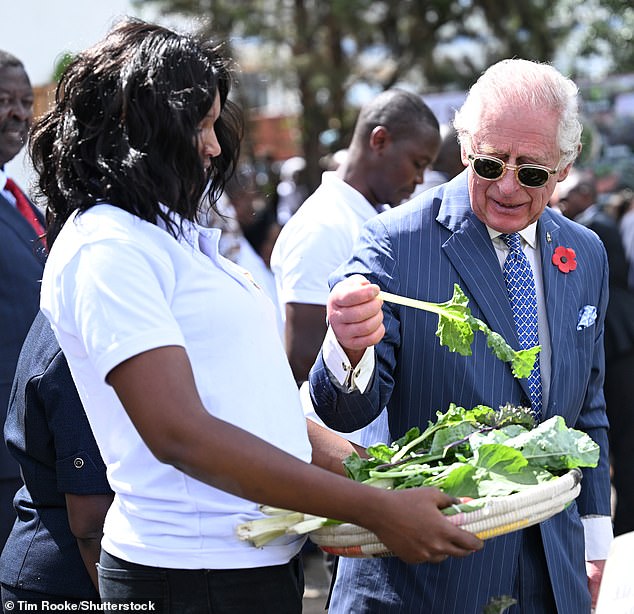
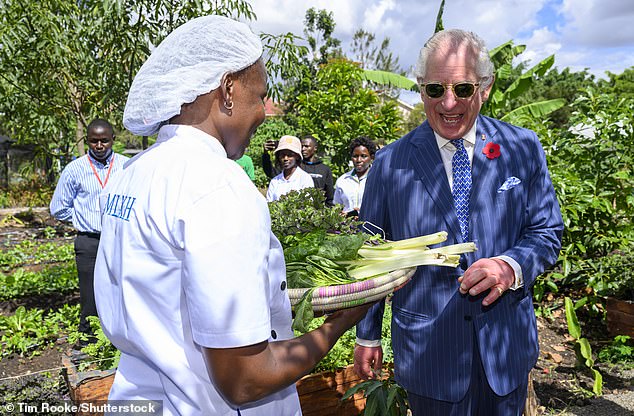
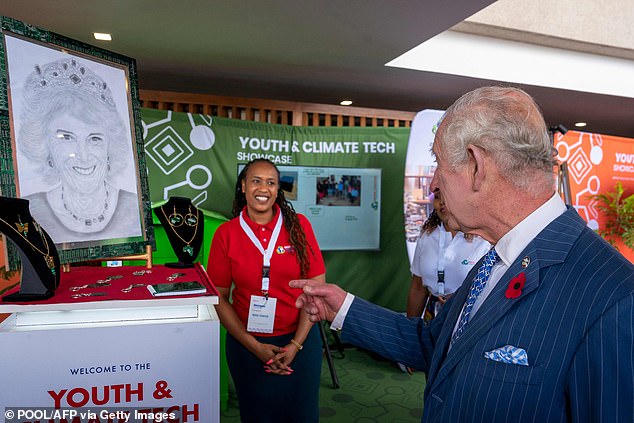
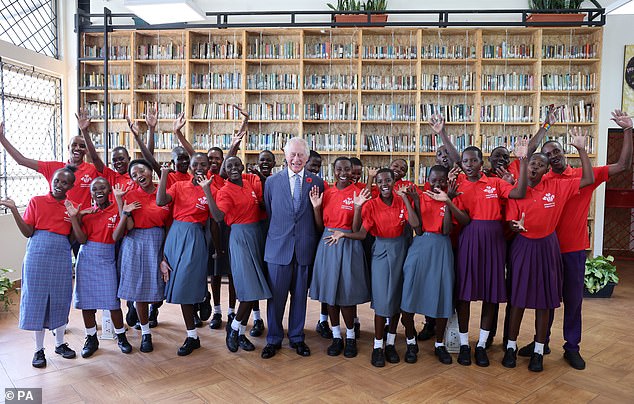
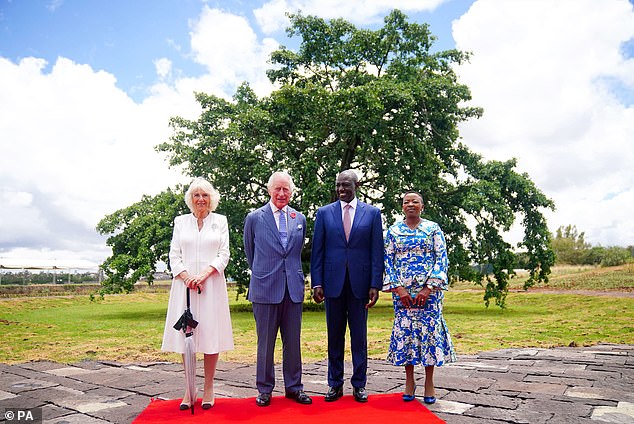

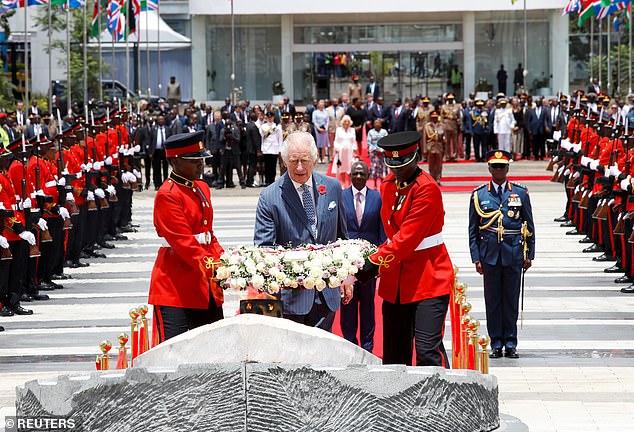
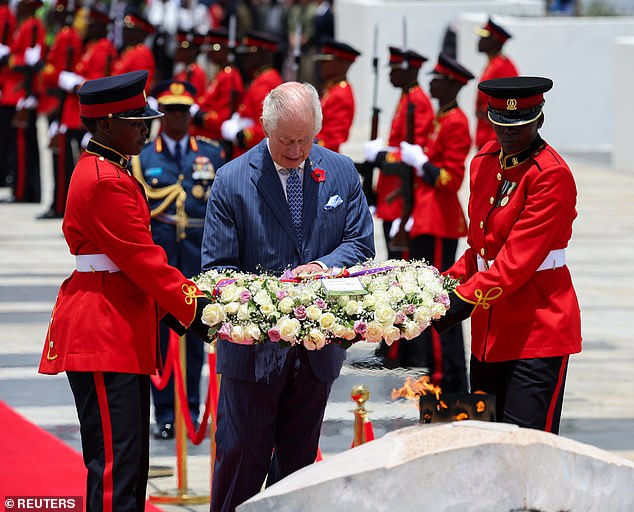
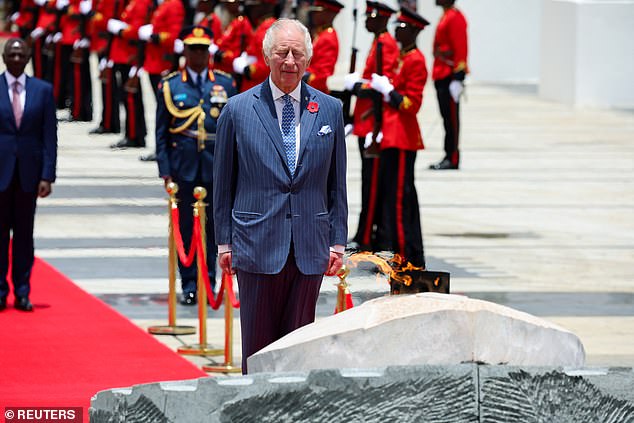
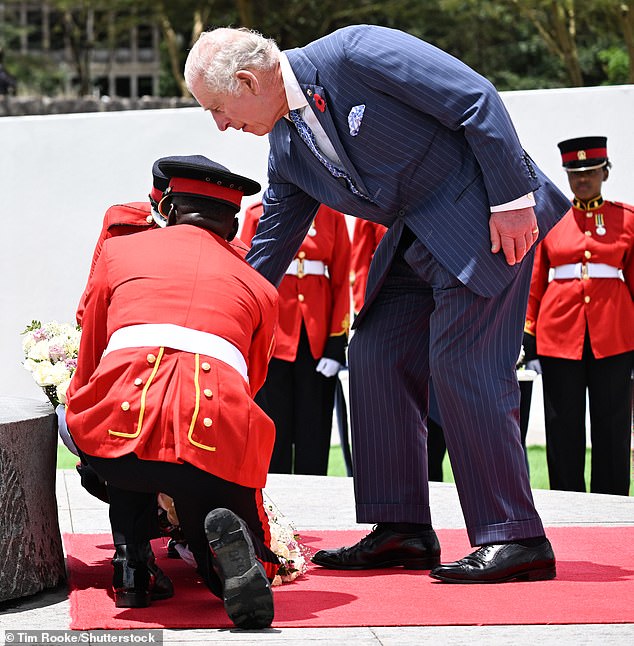
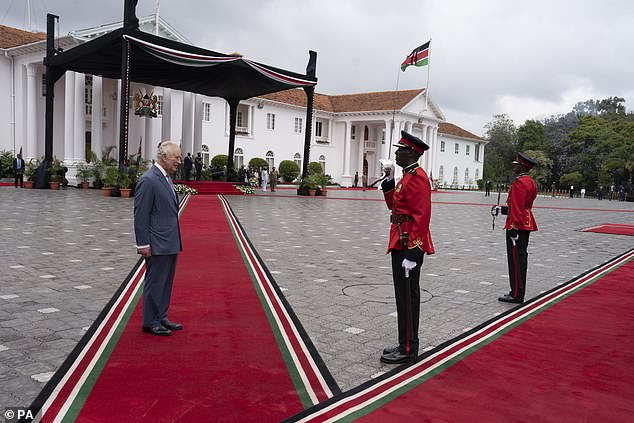
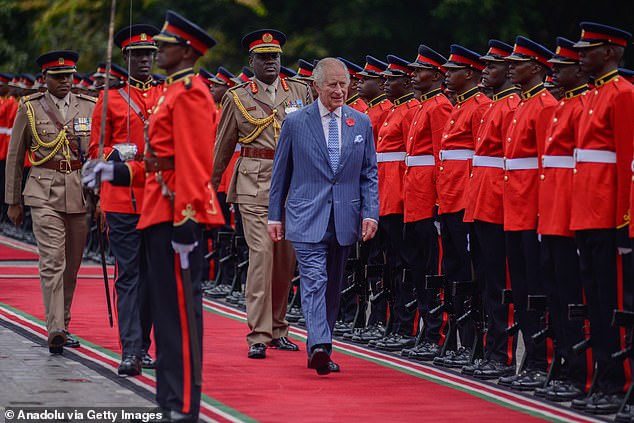
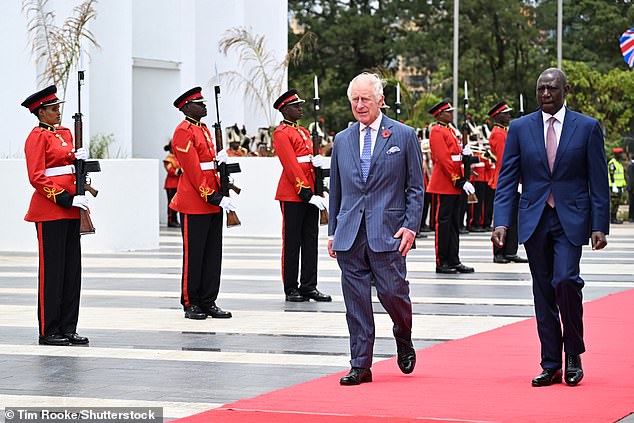
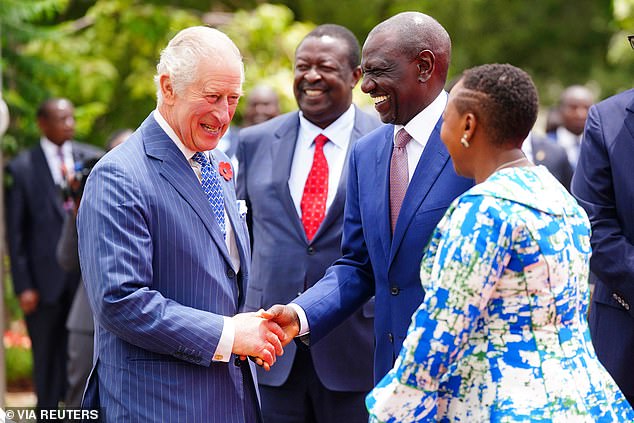
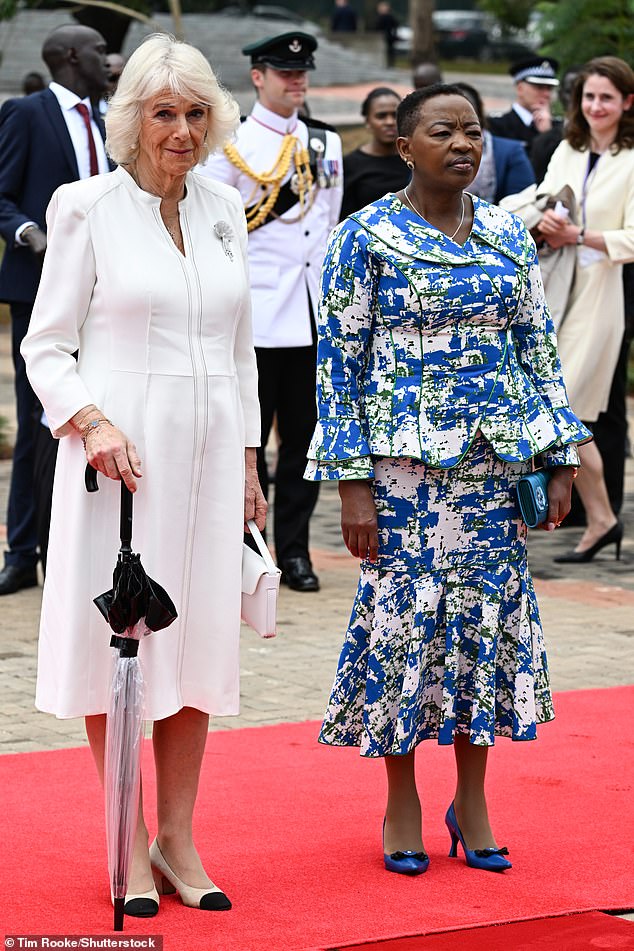
Charles marvelled at the larvae of black soldier flies used to turn vegetable waste into fertiliser, and seemed impressed by the farm’s use of natural pesticides, including rabbit urine, and vertical planting.
For a brief moment, he popped into a polytunnel where roasting temperatures are helping to ripen tomatoes.
Mr Kimani said after the royal visit: ‘Taking the King around the farm means that our idea is something that can go out there and it can be accepted anywhere by anyone. So we are very much glad for the validation of the idea.
‘Growing our crops organically was a huge thing for him, he really liked the idea of how we are growing things and really taking back control of our own food system.’
Today will end with a state banquet in the King and Queen’s honour, where Charles will give a speech to guests including prominent Kenyans and UK figures. He is expected to acknowledge the ‘more painful’ aspects of Britain’s colonial relationship with Kenya, including atrocities and the execution of 1,000-plus people perpetuated during the Mau Mau rebellion, when he gives a return toast at the banquet.
But Charles is unable to offer an official apology, despite calls by activists who also want Britain to pay further damages over human rights abuses dating back to the 1950s. This is because he is visiting at the request of the British Government which, while having already paid out nearly £20million in compensation, has not apologised.
Ear;ier the King laid a wreath at the Tomb of the Unknown Warrior at Uhuru Gardens on the outskirts of Nairobi on a trip dominated by Kenya’s colonial past.
Charles, who has been accompanied by Queen Camilla, then walked to the Mugomo Tree. The fig tree marks the spot where, on the night of December 12, 1963, Kenya celebrated its independence by lowering the Union Flag and raising the flag of Kenya. It is viewed as modern Kenya’s birthplace.
The King and Queen were told how a fig tree planted to mark the moment Kenyan independence was declared was considered a shrine and a ‘memory’ of the country’s turbulent history.
They were also warned that no one must take cuttings from it, and those who did were struck by lightning and died.
Their Majesties visited Nairobi’s Uhuru Gardens, where the King unveiled a plaque and laid a wreath at the Tomb of the Unknown Warrior.
The couple then viewed the Mugomo Tree, planted on the day Kenya declared its independence. Uhuru, in Kiswahili, means ‘freedom’.
The King and Queen listened intently as Samson Malaki, curator at the nearby Mashujaa Museum, which tells the story of Kenya’s history, explained the tree’s significance.
‘It is a tree that marks our history,’ he said. ‘This tree is not just a historic landmark, but it is a shrine.
‘This country was planted as a result of what we went through as a country, as a memory, as far as this country is concerned.’
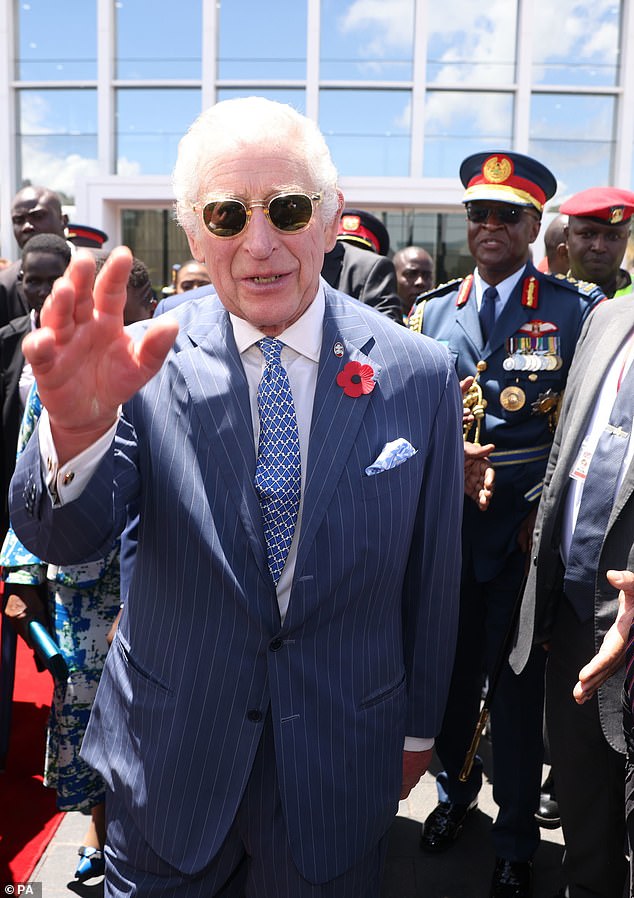
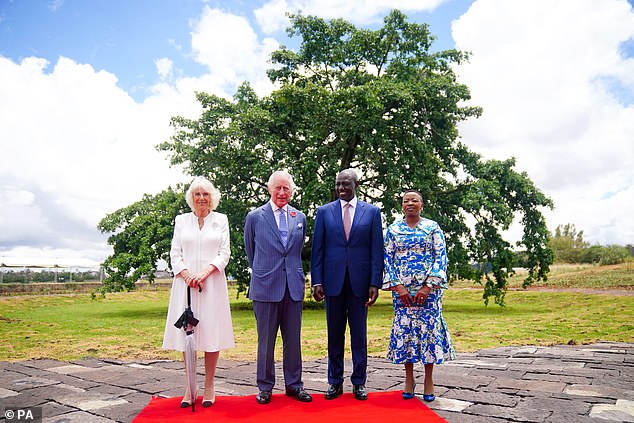
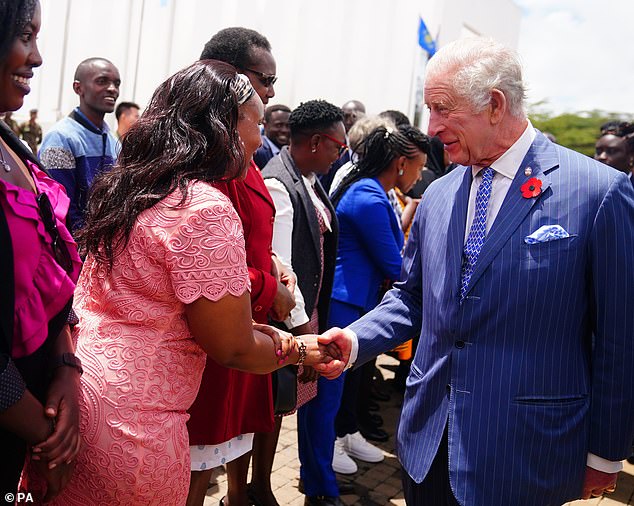
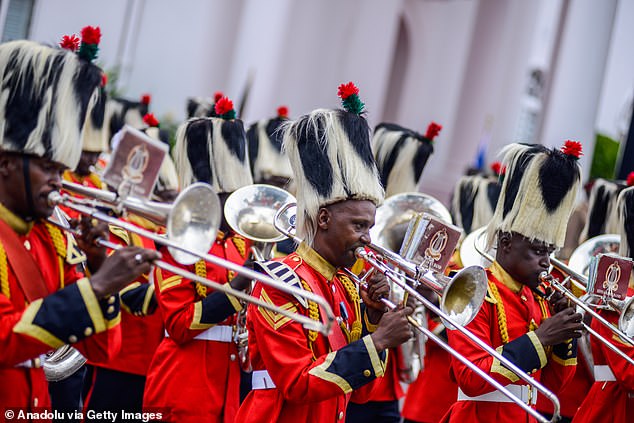
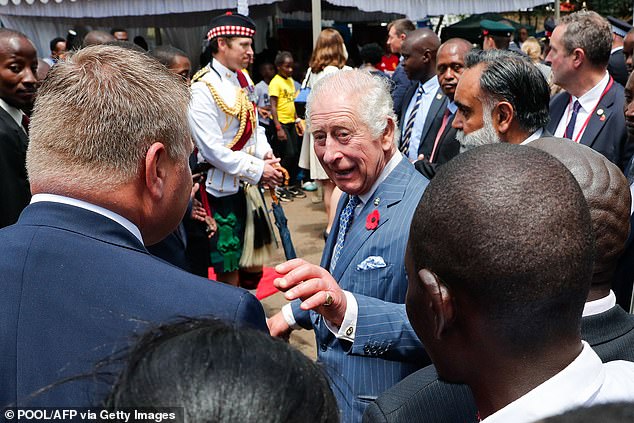
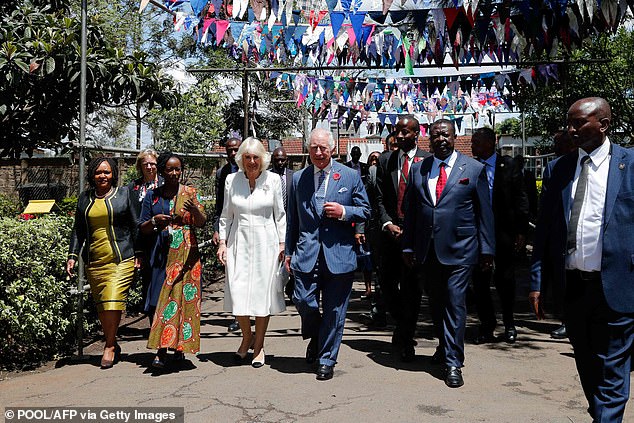
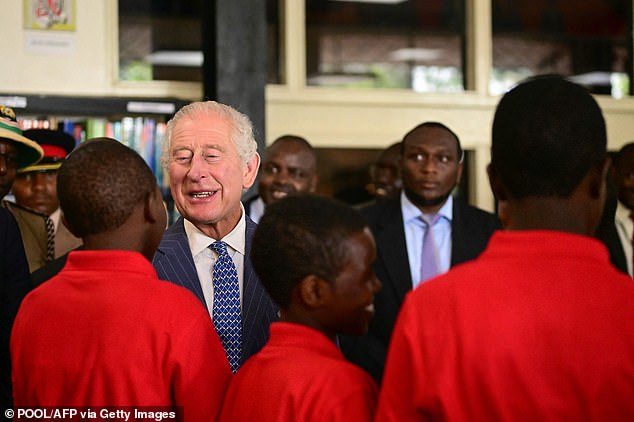
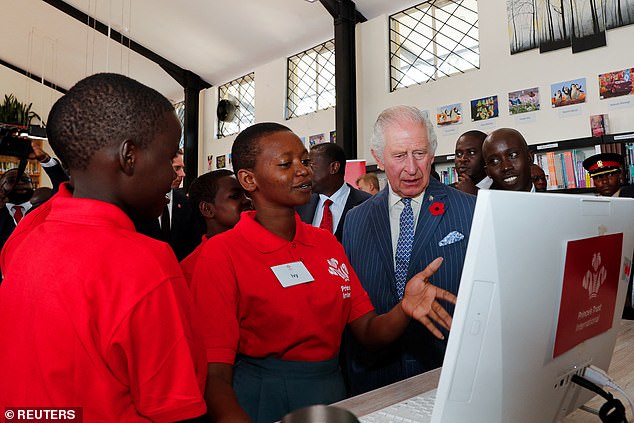
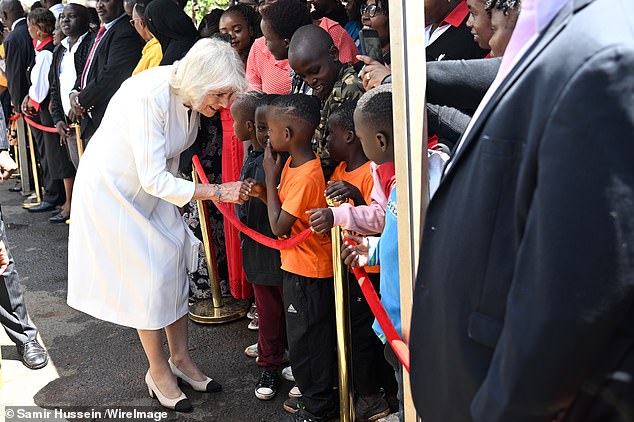
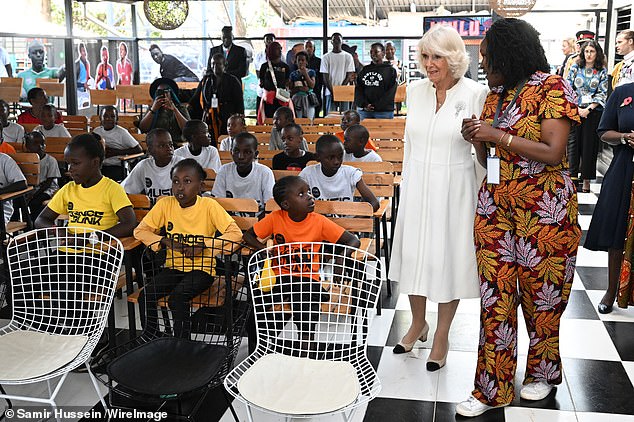
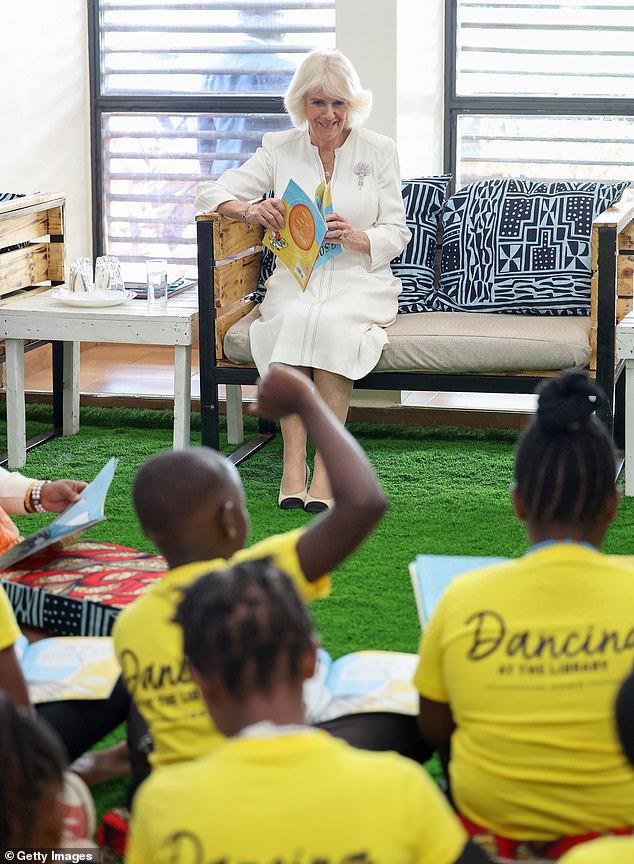
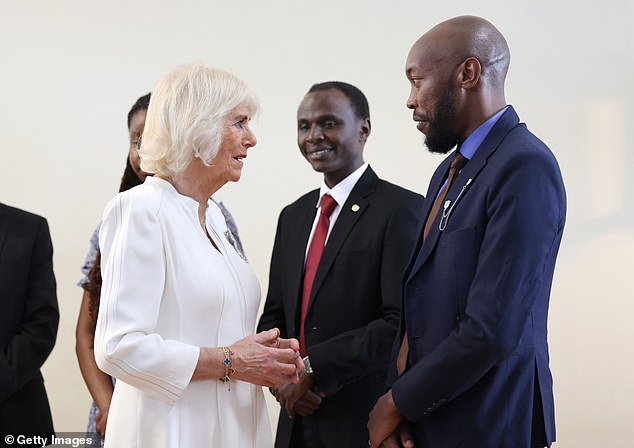
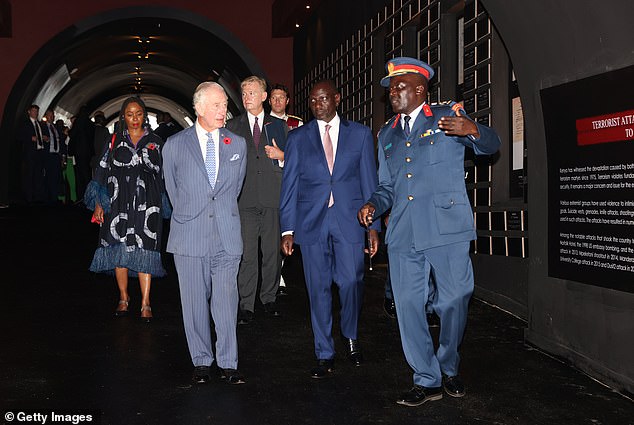
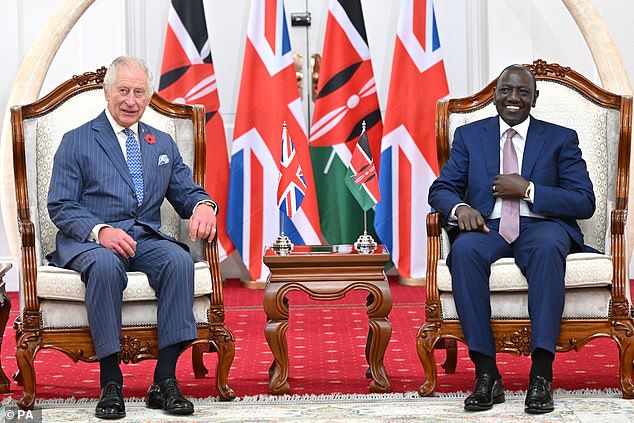
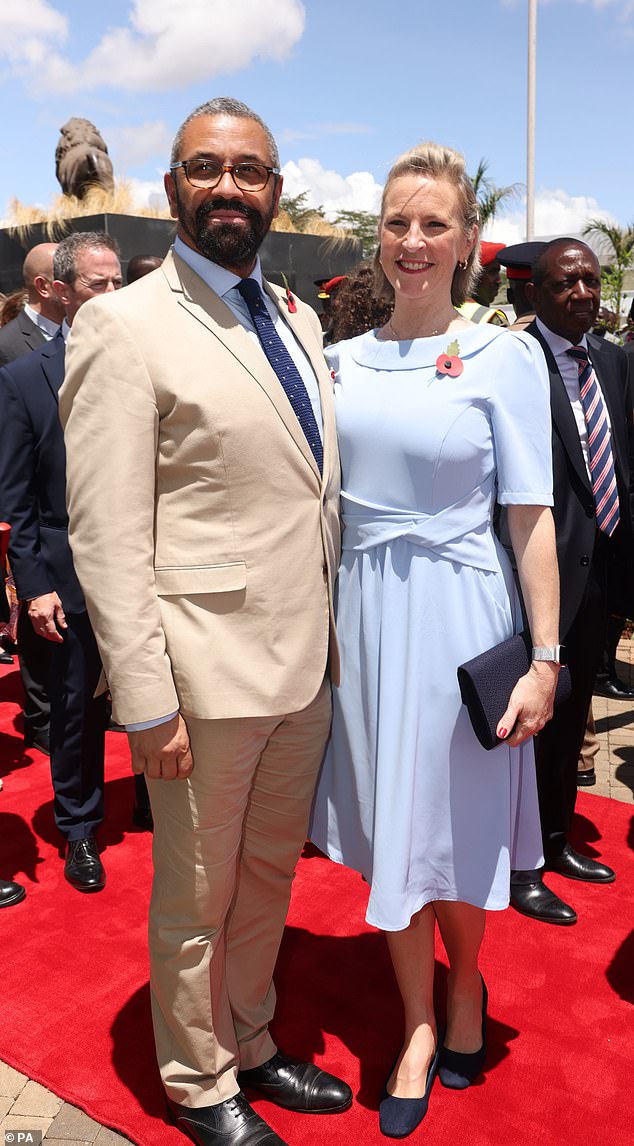
He told royal visitors that various Kenyan communities made pilgrimages to the tree to carry out cultural practices under its branches, including the offering of animal sacrifices, prayers and blessings.
He told them the tree was almost 59 years old but should live for up to 300 years, and will therefore be seen by many generations to come.
The royal visitors were told it was considered a shrine because when branches were once cut off it, the perpetrators were struck by lightning. Mr Malaki said no one was allowed to take cuttings from the tree and it must die naturally.
The King appeared fascinated by the tree and asked if it bore fruit.
Earlier, Their Majesties were greeted by Kenya’s president William Ruto and his wife, First Lady Rachel Ruto, on arrival at the gardens.
They stood for the national anthems of both the UK and Kenya, played by the Kenya Defence Forces Band.
Charles then pulled on a flag to unveil a plaque marking the occasion of their visit.
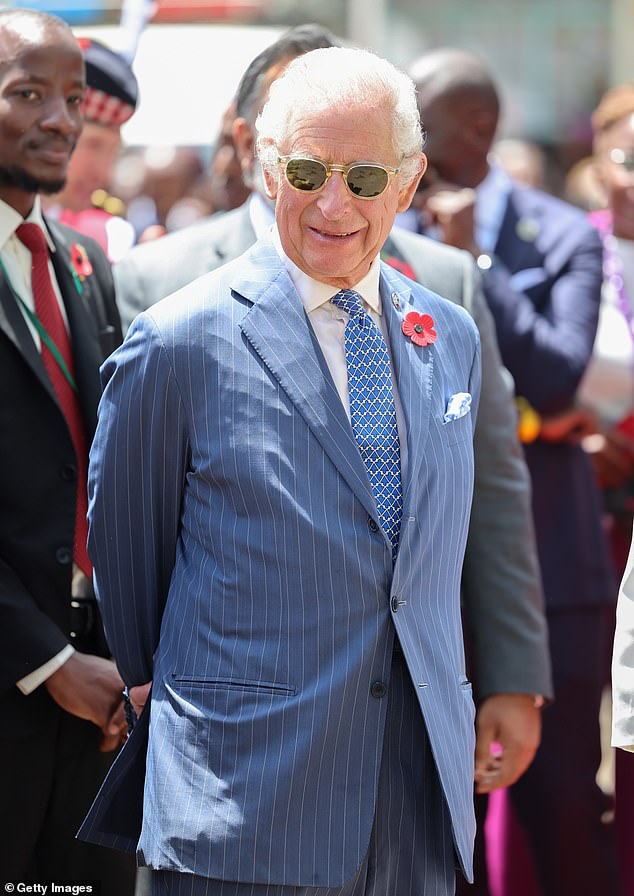
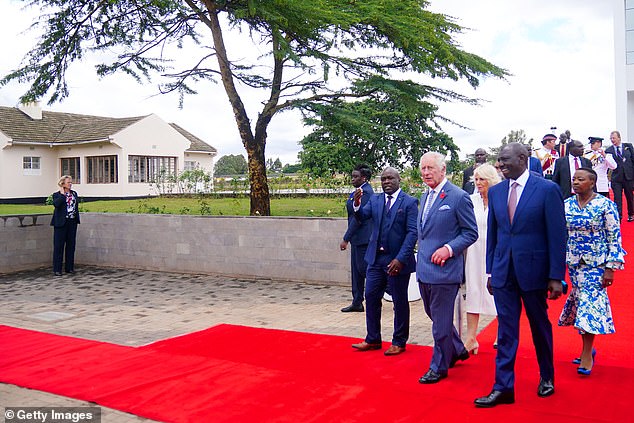
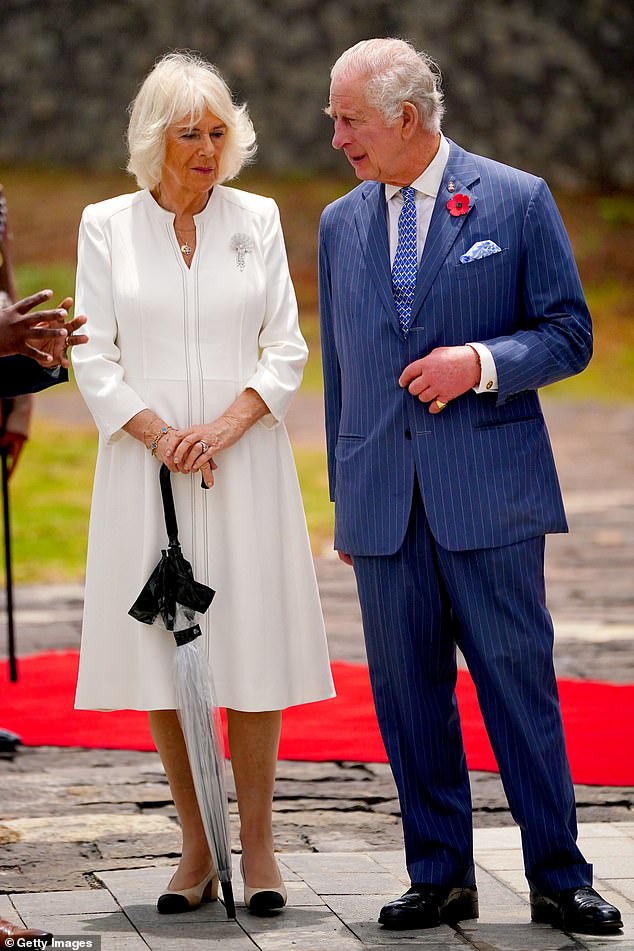
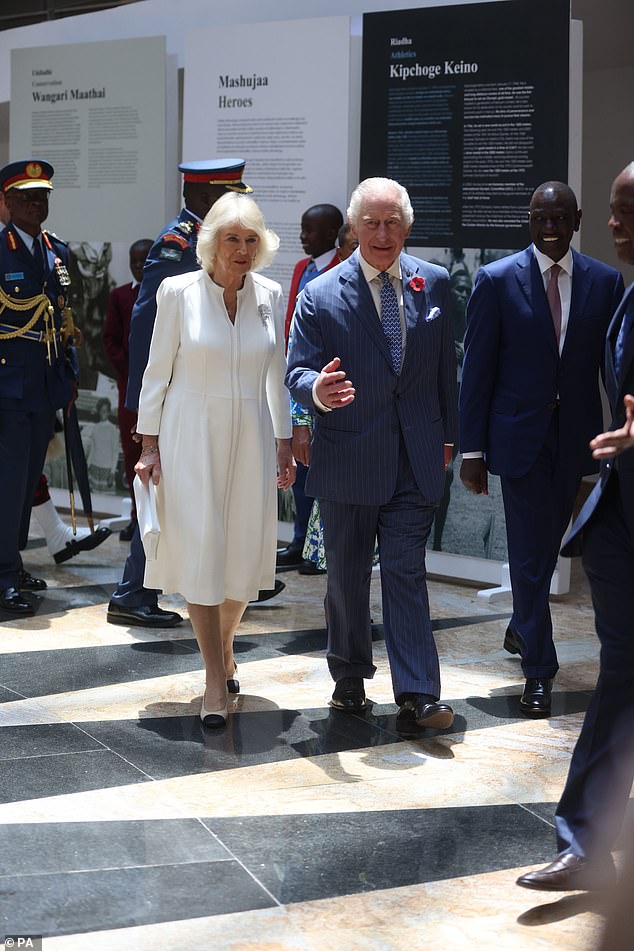
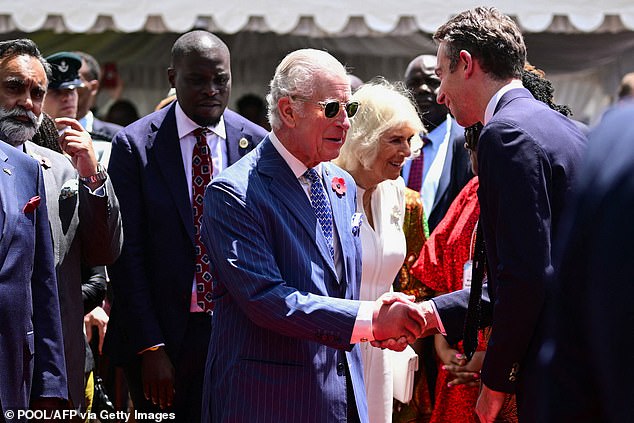
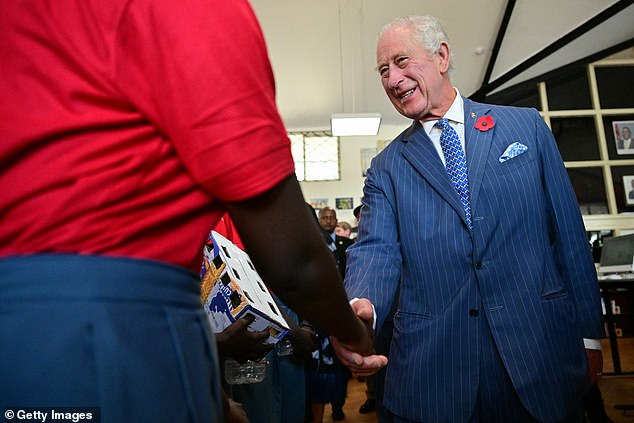
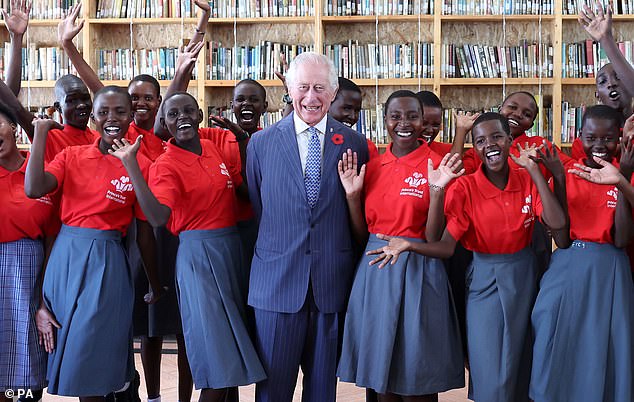
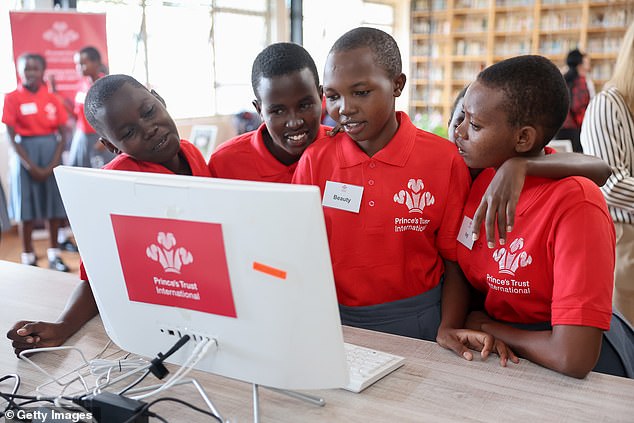
The King and President Ruto walked along the red carpet towards the Tomb of the Unknown Warrior.
As they approached the memorial, they paused and stood in solemn silence as the Last Post was played.
The King then stepped forward to aid the laying of a large wreath by two female soldiers on his behalf.
He touched it before taking a step back and pausing briefly to reflect before President Ruto did the same.
The King and Queen did a brief walkabout, greeting military families who had lined up to meet them. As they shook hands, Charles referred to the inclement weather as he said: ‘Don’t get too wet!’
Earlier his Majesty held a bilateral meeting with the president, while his wife was shown a gallery of images by the First Lady and told about the work of MaMa Doing Good, the socio-economic development organisation she founded in 1997 to help women, youth and vulnerable people in Kenya.
Charles and Camilla were greeted by Mr Ruto and his wife at the State House in Nairobi.
While the King was smart in a lounge suit, Queen Camilla was elegant in a white crepe silk Anna Valentine dress and a diamond oyster brooch that once belonged to the late Queen Elizabeth II.
Before the formalities began, the foursome posed for a picture for the waiting press with the president’s official residence as a backdrop.
The King later joined Mr Ruto on a dais as a nearby Guard of Honour, formed in two rows, gave a royal salute and both the UK and Kenya’s national anthems were played followed by a 21-gun salute.
Charles inspected the troops, walking past the soldiers in their red tunics and peaked caps.
A teenage Kenyan girl made King Charles laugh today when she told him that a computer game for would-be entrepreneurs had given them the ultimate networking opportunity – by allowing them to meet the King.
She was among a group of children from deprived rural areas who have been helped by a project co-run by Charles’s charity Prince’s Trust International (PTI).
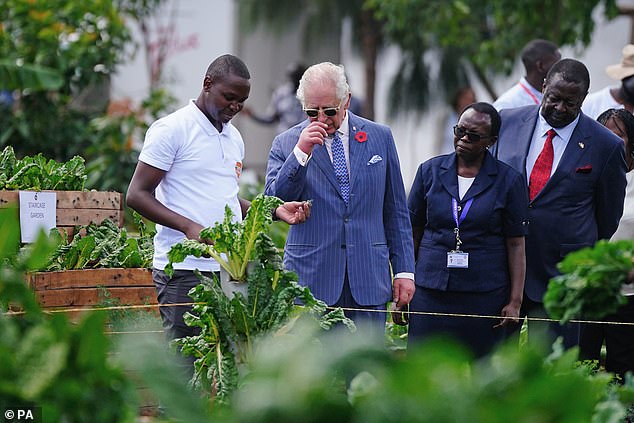
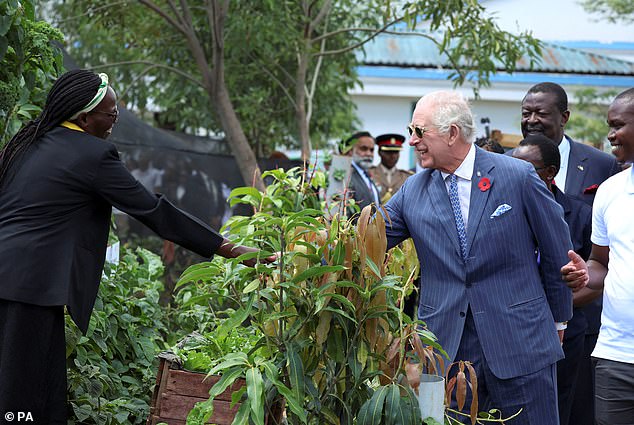
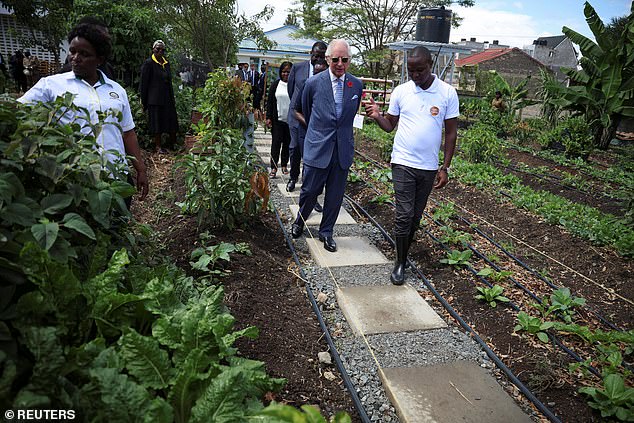
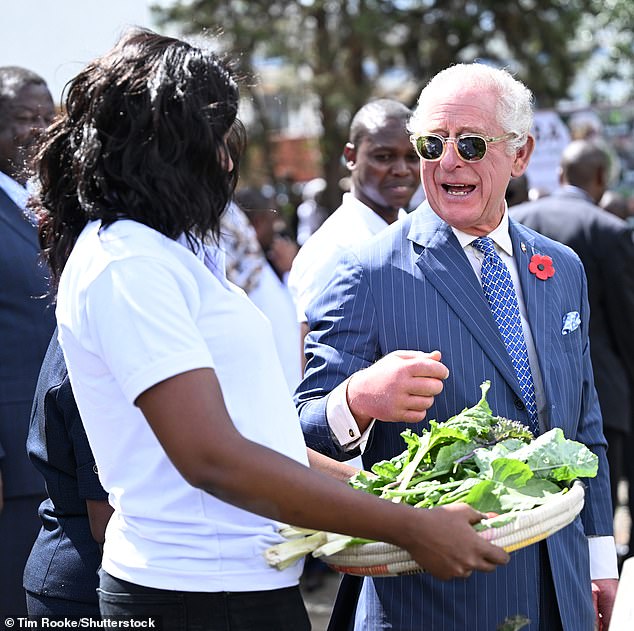
As they arrived at the Eastlands Library Charles and Camilla shook hands with a small crowd outside before going in, where the Queen met the founders of a literary project while the King met youngsters who were taking part in a business simulation game to help them thinking about becoming budding business people.
Some of them had never used a laptop before taking part in the project.
After being shown the game by one group of children, the King said: ‘So you’re learning very fast – faster than me!’
Before he could walk away one girl, Ivy, thanked the King saying that the programme had helped them network by ‘meeting many guys’ – including the King.
The King told one group that a bird feeder they had made from plastic water bottles was ‘very cunning’.
He was also particularly enthralled by one group that was using sustainable methods to nurture seedlings for crops such as tomatoes and guava. ‘All that rain last night is exactly what is needed,’ he said.
He added: ‘I know that the president wants to plant 15 billion trees, so you are going to have to do an awful lot. There are never enough seedlings!’
Erna Grasz, chief executive of PTI’s partner charity, Asante Africa Foundation, said: ‘Three quarters of this group travelled 16 hours by bus from the furthest north of the country. They have never seen a full length mirror. The first night they were here in Nairobi, they were being trained how to use a hot water spigot in the shower. They had never seen hot water coming out of the wall. This was the first time they have ever had a bed they did not have to share with family members.
‘One of them said to me that it is usually us watching the important people on TV. Today the important people get to watch us.’
Will Straw, chief executive of PTI, said their Enterprise Challenge programme was aimed at encouraging young people to think about entrepreneurship as a route to meaningful work. ‘The demographic pressures in Kenya and many other parts of Africa mean that there aren’t going to be enough formal jobs in the economy for young people as they reach the labour market.’
The Queen told children to ‘explore the world’ like they ‘do in books’ after sitting in for a fun-filled Kenyan story time. Fourteen children at Eastlands Library, in Nairobi, read passages from ‘Lion and Mouse’ by Catalina Etcheverri. The Queen, 76, smiled as she sat on a chair and the youngsters energetically read the book to her while they rested cross-legged on the floor. She smiled broadly and gave them a huge round of applause then bent down to speak to the boys and girls. The Queen said: ‘You are all very good readers. Work hard and keep reading.’
Mary Kinyanjui, of Kenya National Library Service, said afterwards: ‘She encouraged them to continue to read and to explore more about the world as they do in story books.’ The Queen was at Eastlands Library to meet the founders of Book Bunk, a Kenyan charity that restores public libraries into ‘Palaces for People’. Outside she paused to shake hands with delighted well-wishers and children and to shake their hands. Inside she was welcomed by Book Bunk Founder and publisher Ms Angela Wanjuka and author Wanjiru Koinange. She met local performers and artists before viewing the library’s giant chess board and time capsule. And she paused to greet 2021 Queen’s Commonwealth Essay Competition winner, Ms Kayla Bosire.
Neil Wigan, the UK High Commissioner to Nairobi, said: ‘Every Kenyan I’ve talked from the president downwards has just been delighted about the royal visit, and really pleased that the first Commonwealth trip that the King is doing he has chosen to do it to Kenya.
‘They feel a really close link with the royal family, through the [late] Queen, through the King – I think it is his first official visit.
‘Most people are focused on that, they talk about what they would like to get out of Britain today. They value that relationship with Britain.’
He said Kenya had been chosen as the King’s first Commonwealth visit partly because of the relationship with the royal family, but also because Britain’s relationship with Kenya was ‘really strong’.
He added: ‘Kenya is a key country, everything from counter-terrorism and climate change to trade. It’s a really fast-moving country, and it is one where we want to use the magic dust of the royal family to build a relationship.’
While some people are pressing for reparations and an apology for Britain’s treatment of the Mau Mau rebels in the 1950s, he said they were in a minority.
Wigan said: ‘I’ve met quite a lot of people from the communities who were directly affected, and actually most of them are more focused on the future, about how we do things together. Most Kenyans are nothing but positive about the visit.’
The visit is the King and Queen’s first to a Commonwealth country, which will strengthen the UK’s relationship with Kenya through the ‘soft diplomacy’ of the royal family.
Kenya is celebrating the 60th anniversary of its independence from Britain and Charles later held a bilateral meeting with the Kenyan statesman while Camilla had separate talks with Mrs Ruto.
Charles and Camilla arrived last night on an RAF Voyager aircraft in Nairobi and left the plane with no fuss or fanfare in what was billed an ‘administrative arrival’ ahead of the ceremonial welcome in the capital today.
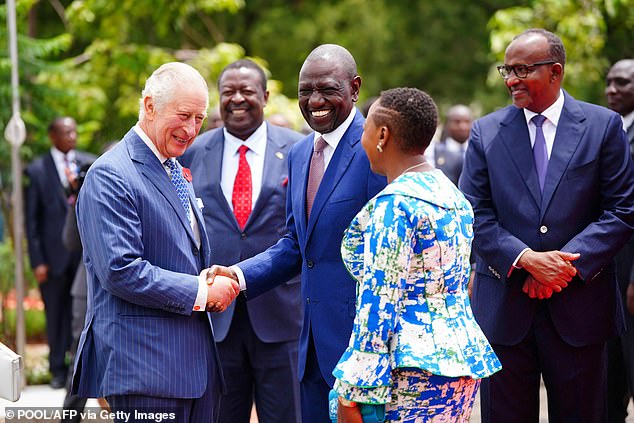
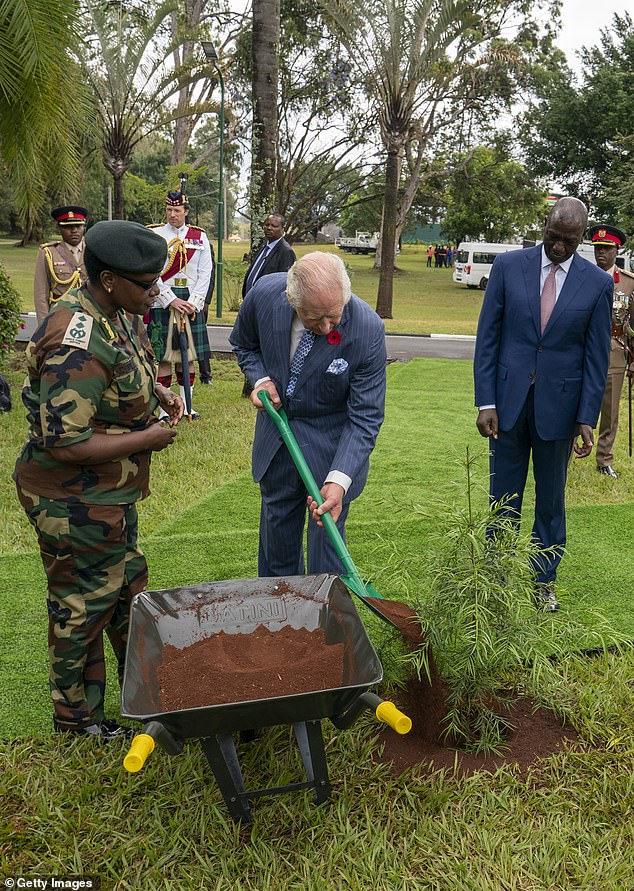
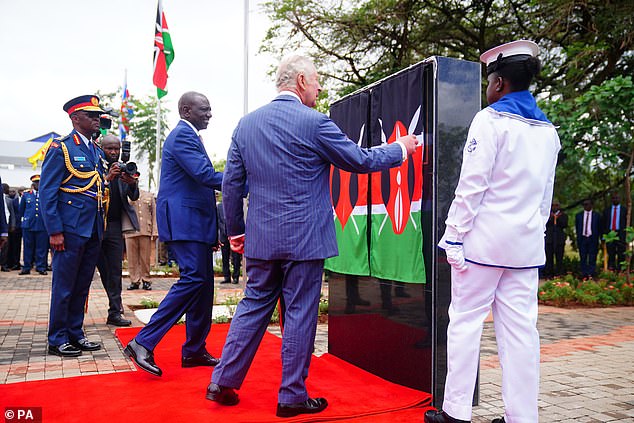
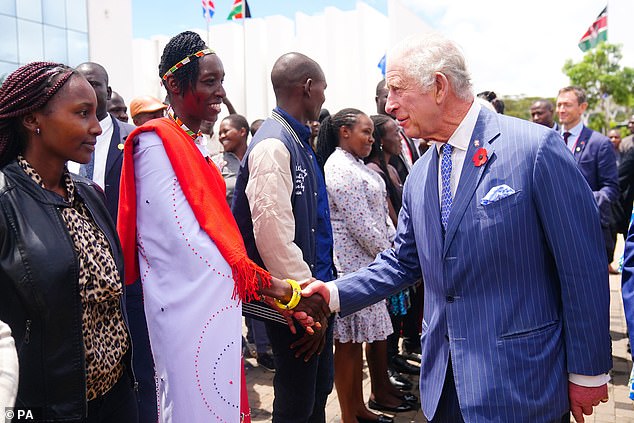
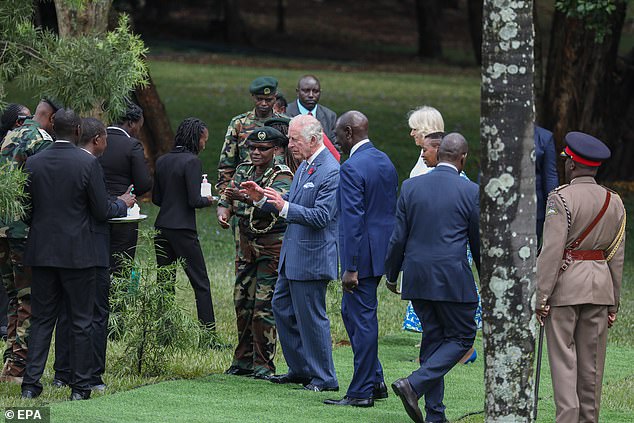
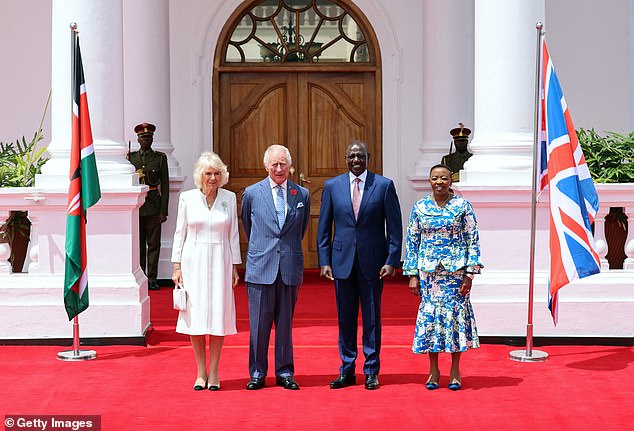
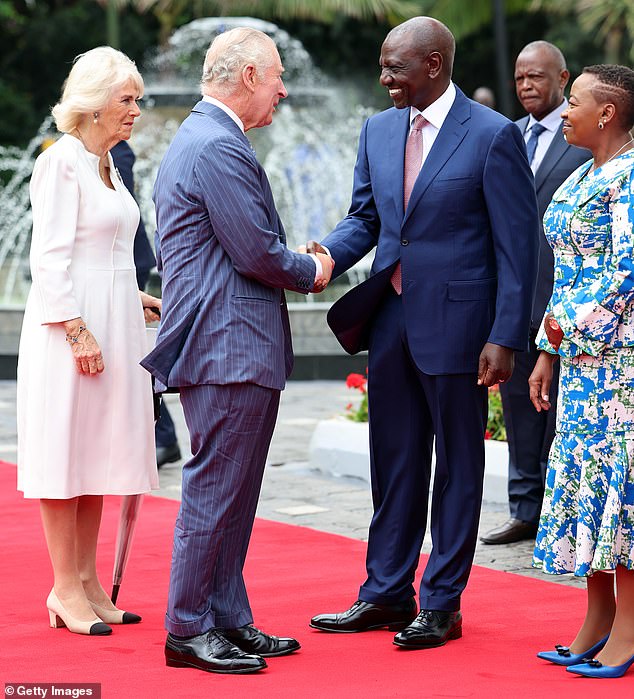

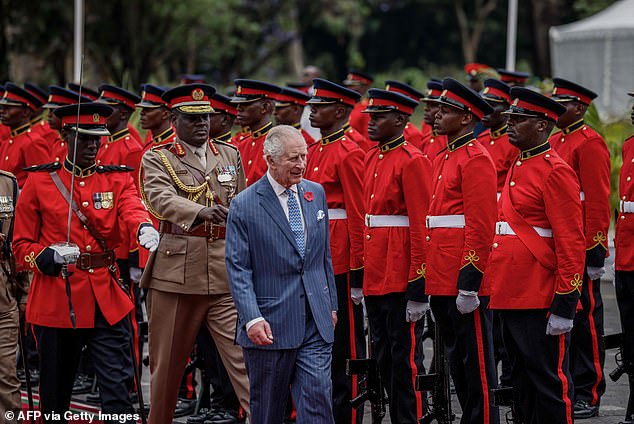
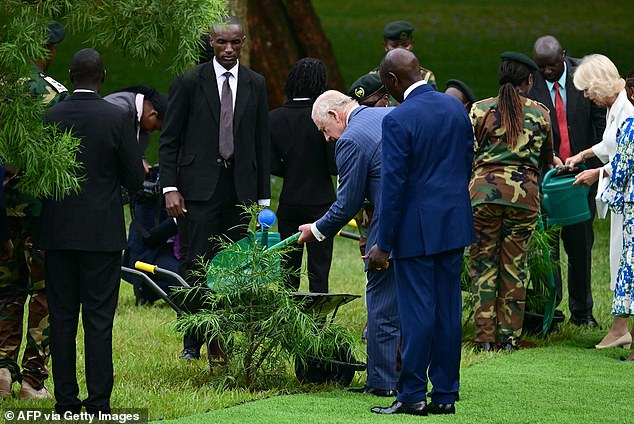
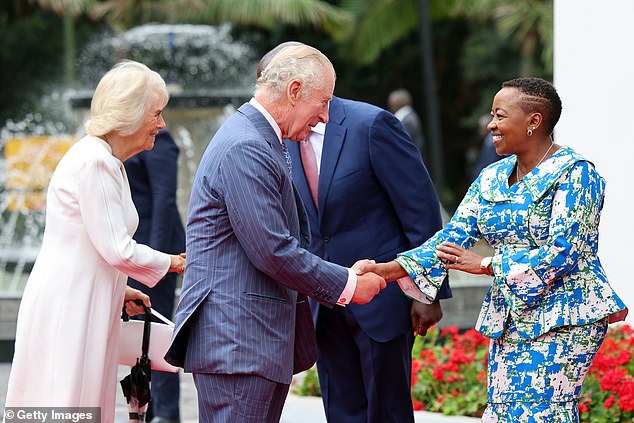
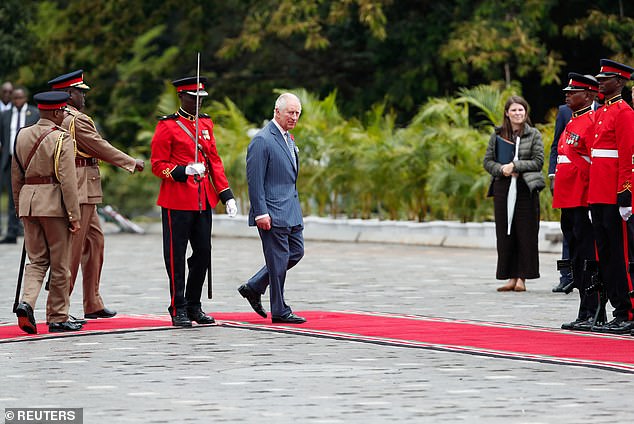

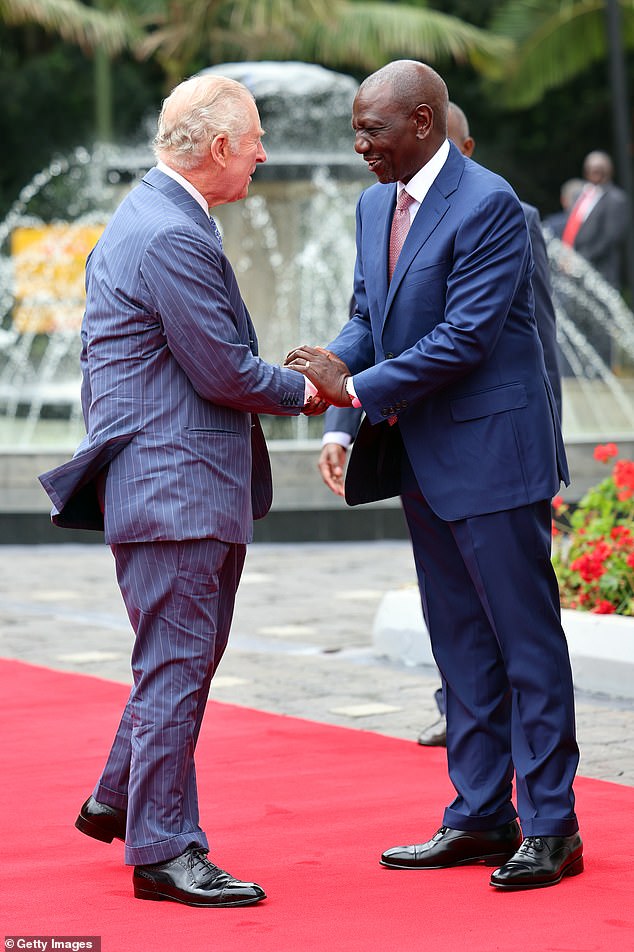
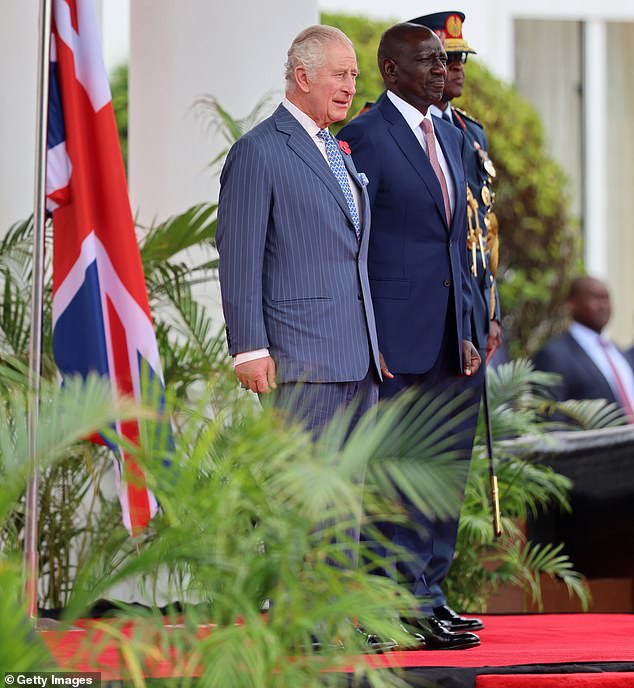
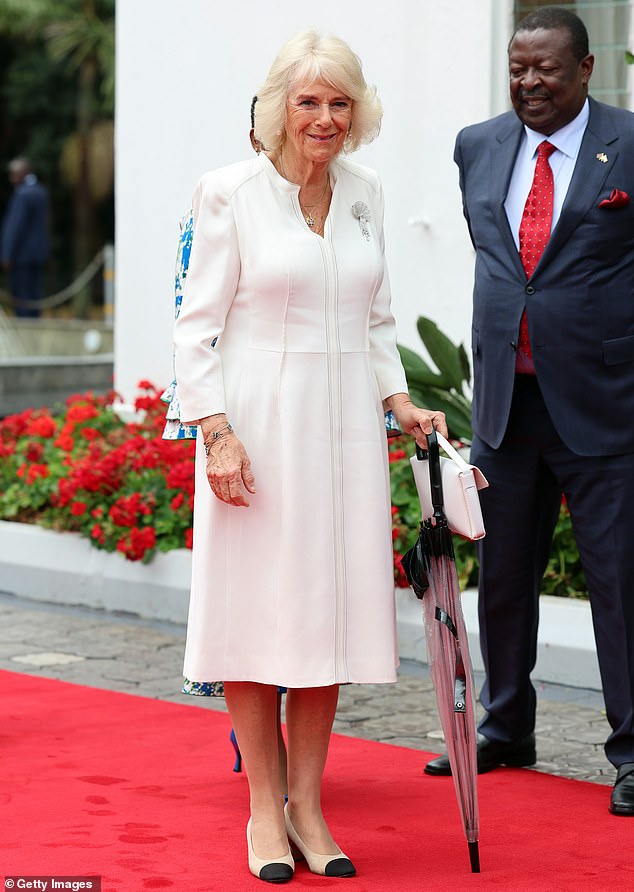
President Ruto, who invited the British monarch, is also said to be keen that the royal visit looks to the future.
But the King, who through earlier trips to France and Germany as well as his handling of the Middle East crisis has proved an adept statesman, is determined not to sidestep the issue.
And it is thought that the banquet, which is set to include his first major public address of the trip, will be the perfect occasion.
One royal source told the Daily Mail that the King personally believed that it was ‘right’ for people to want to be heard and acknowledged at ‘the highest of levels’.
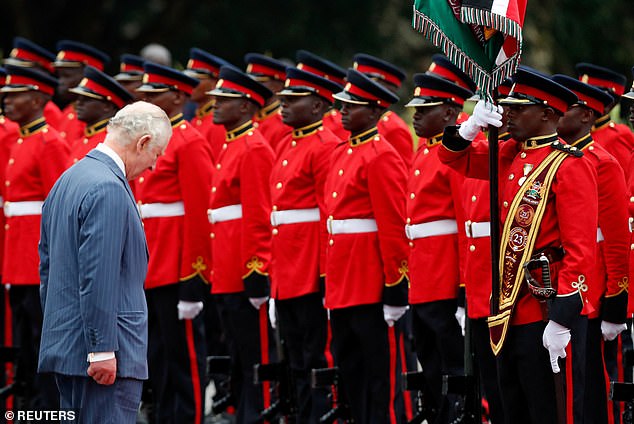
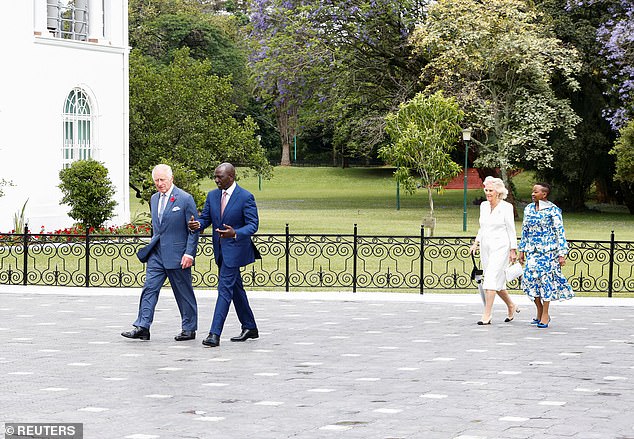
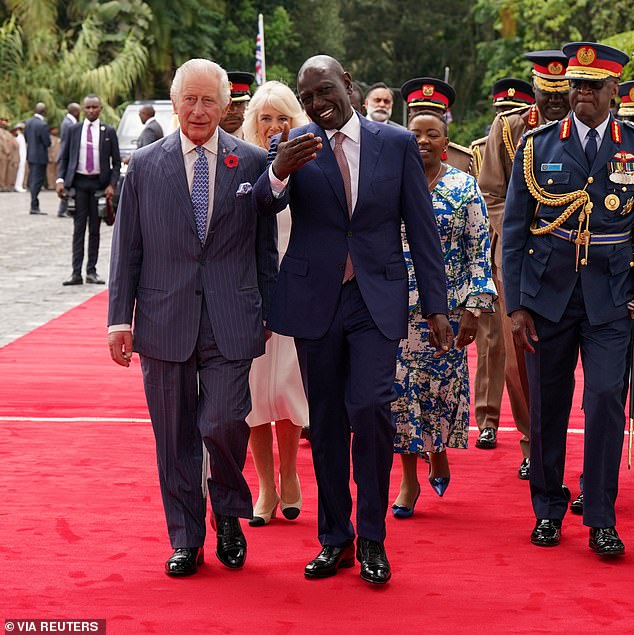
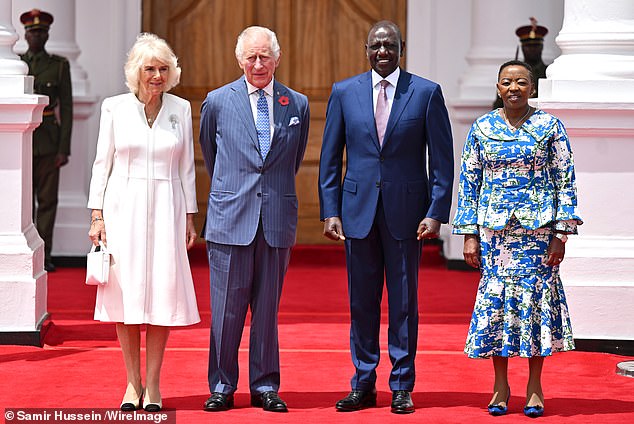

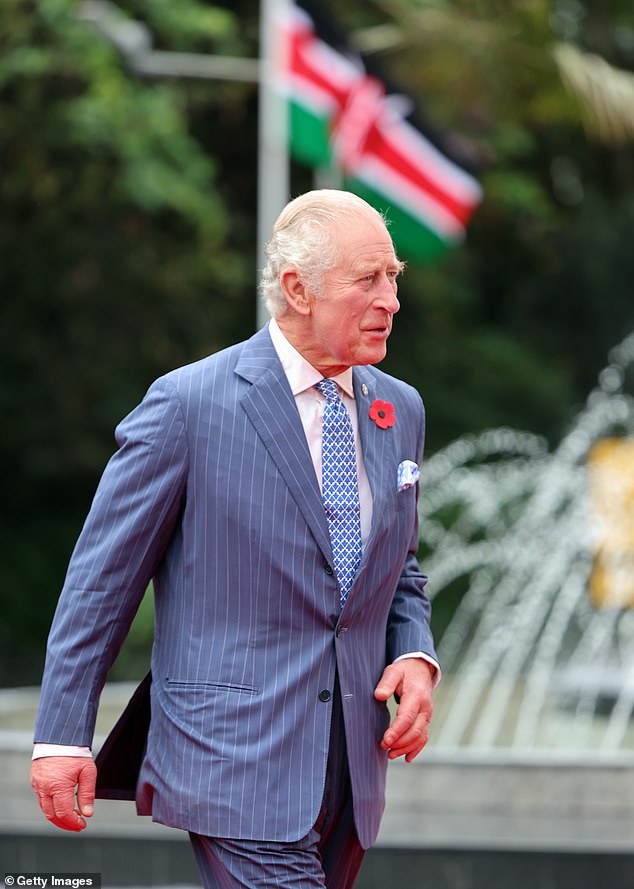
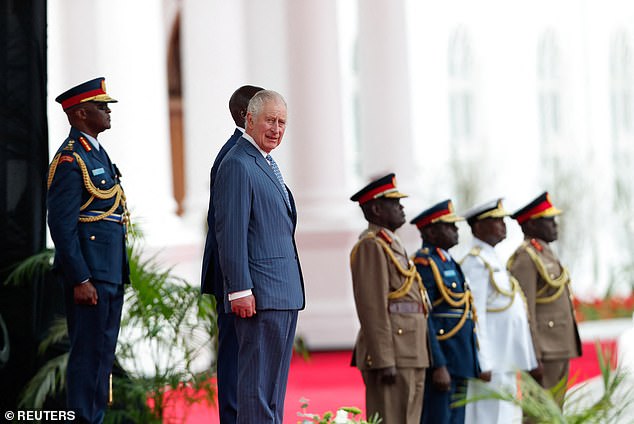
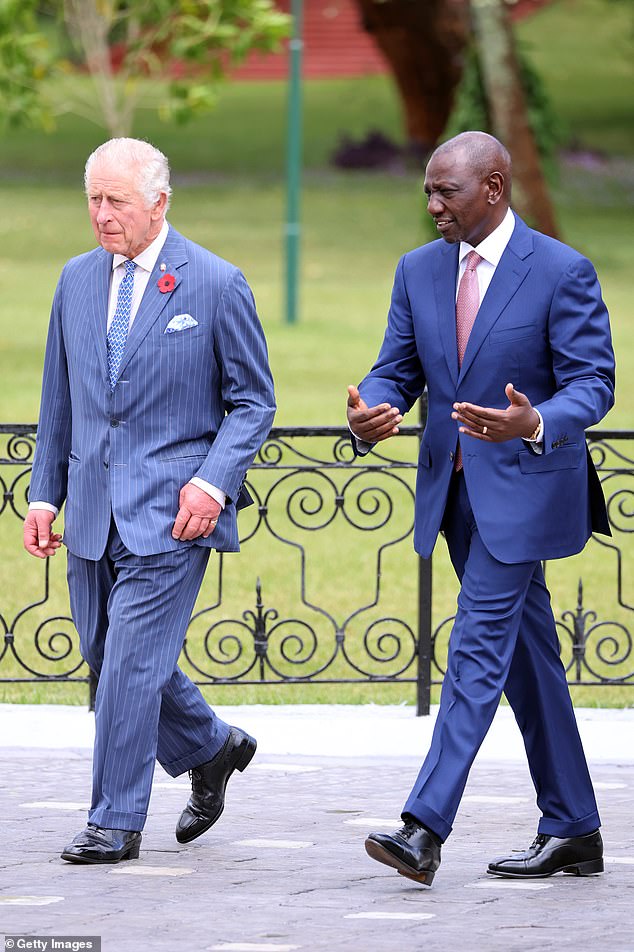
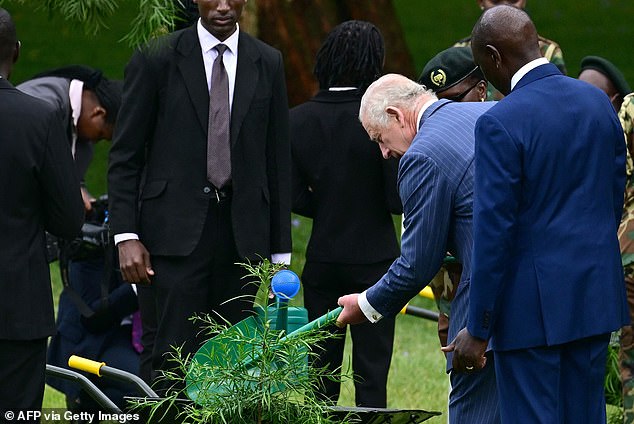
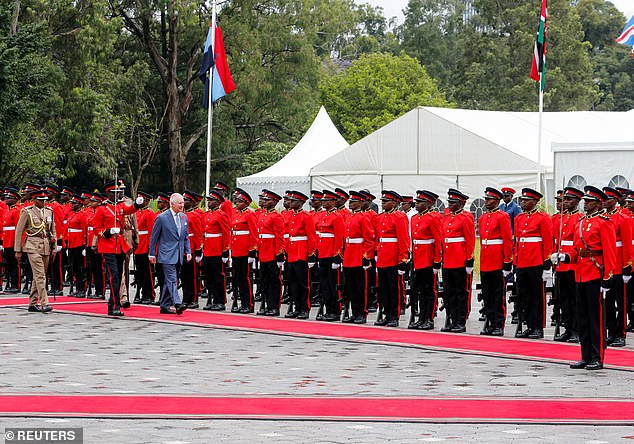
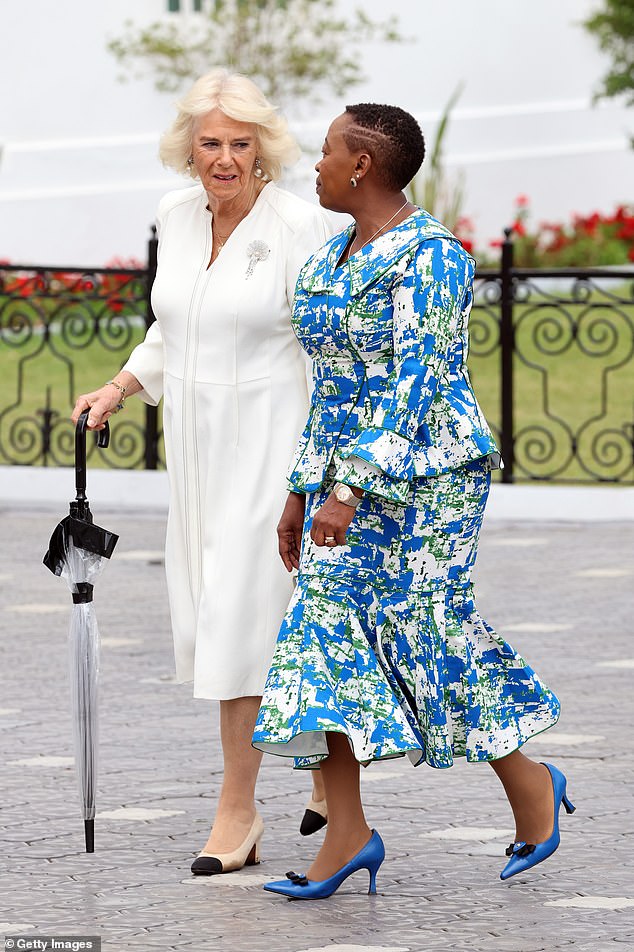
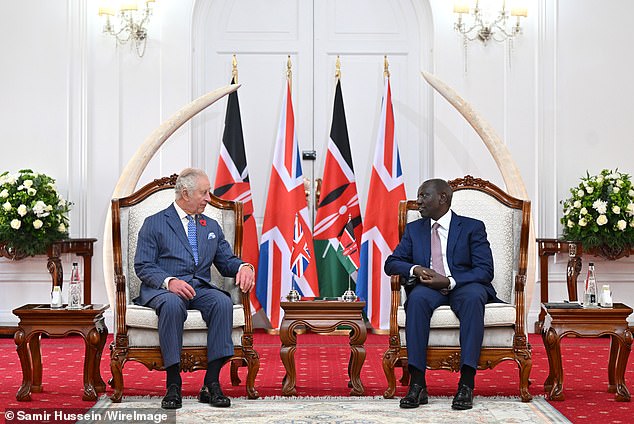
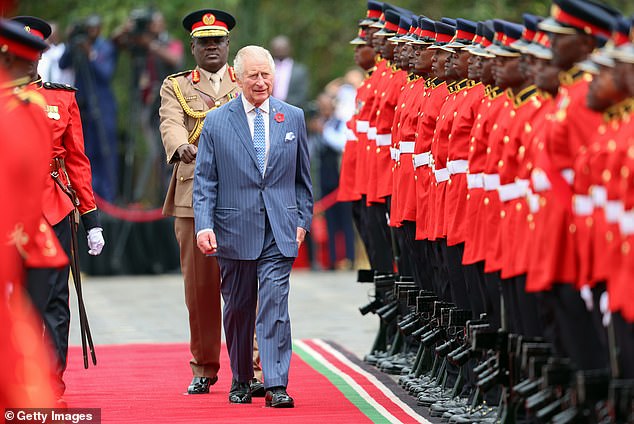
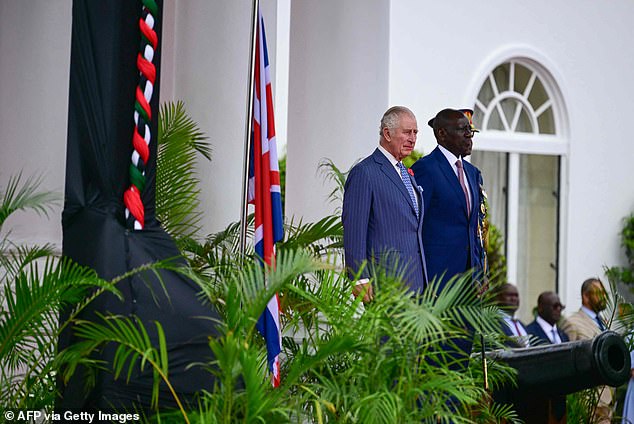
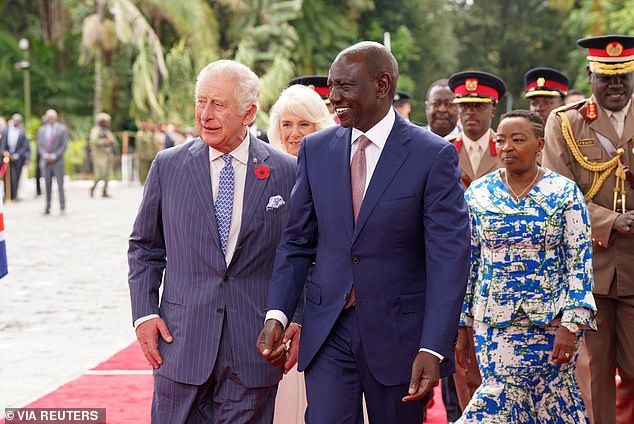
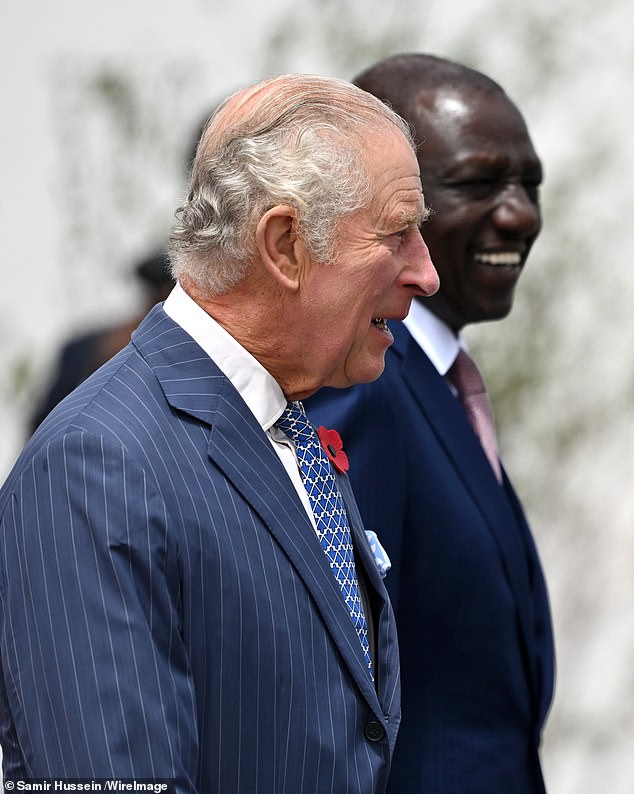
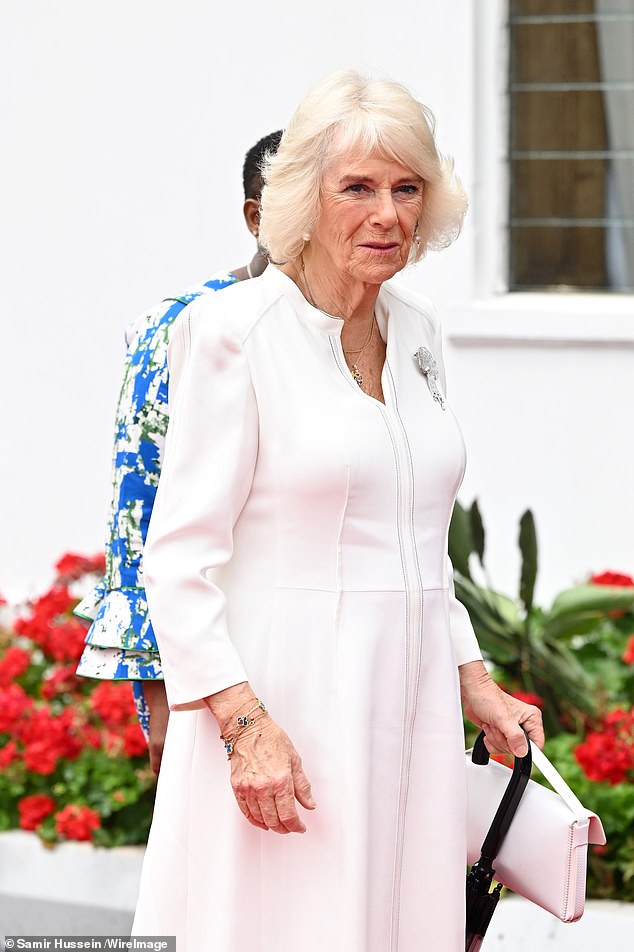
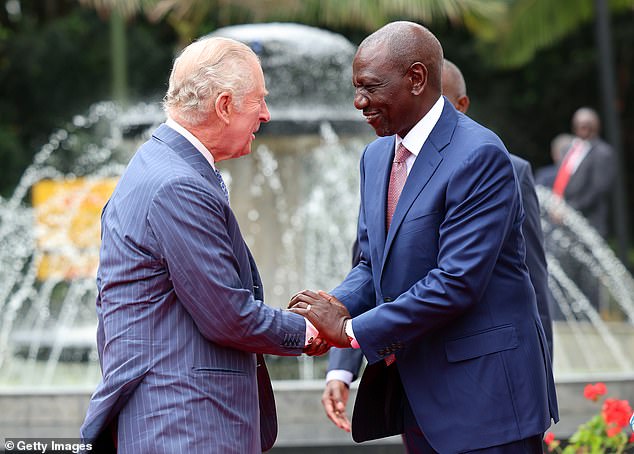
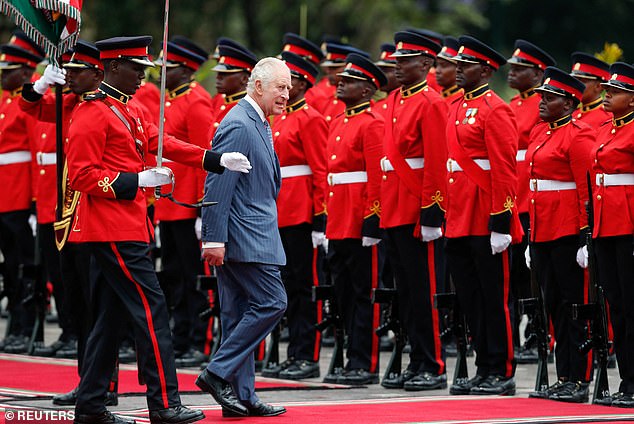
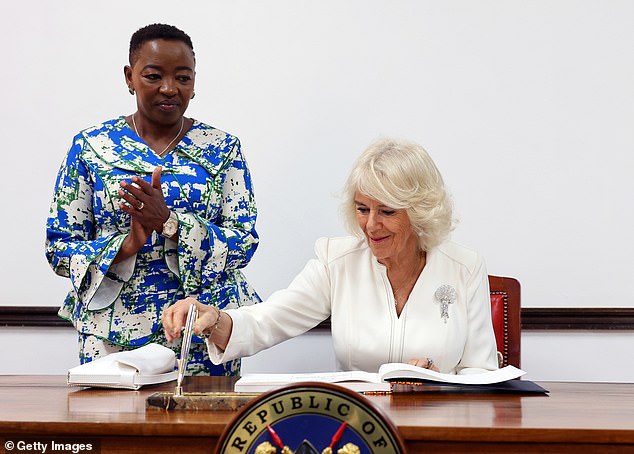
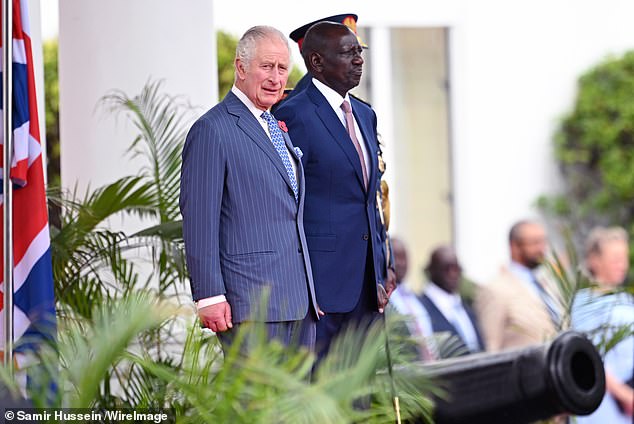
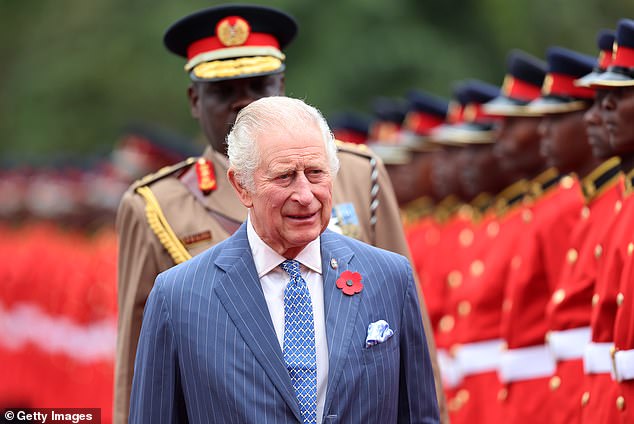
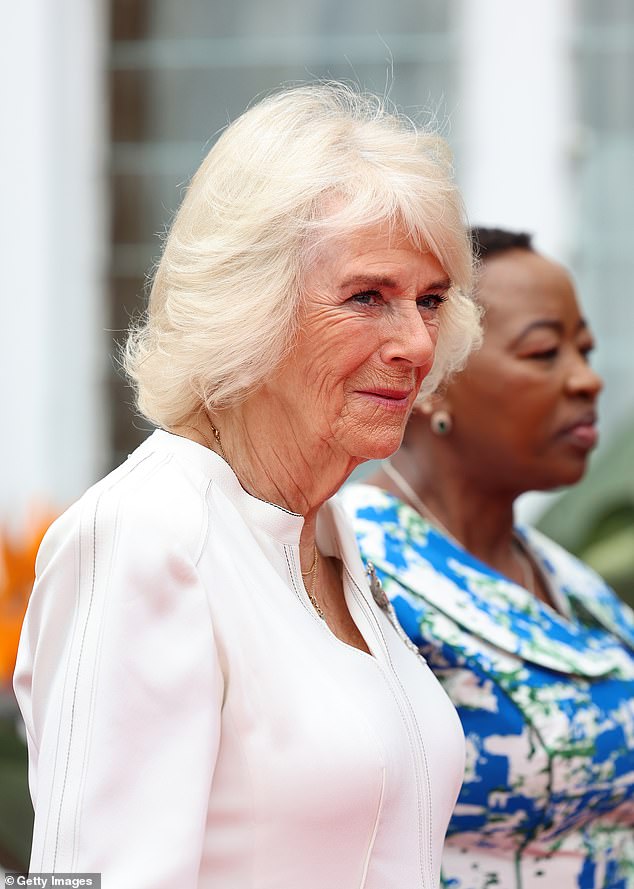
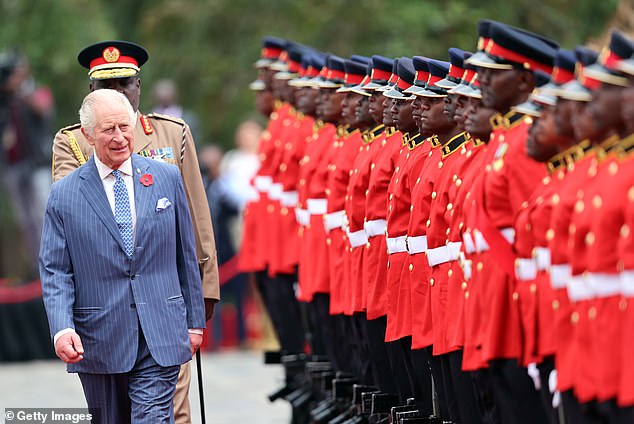
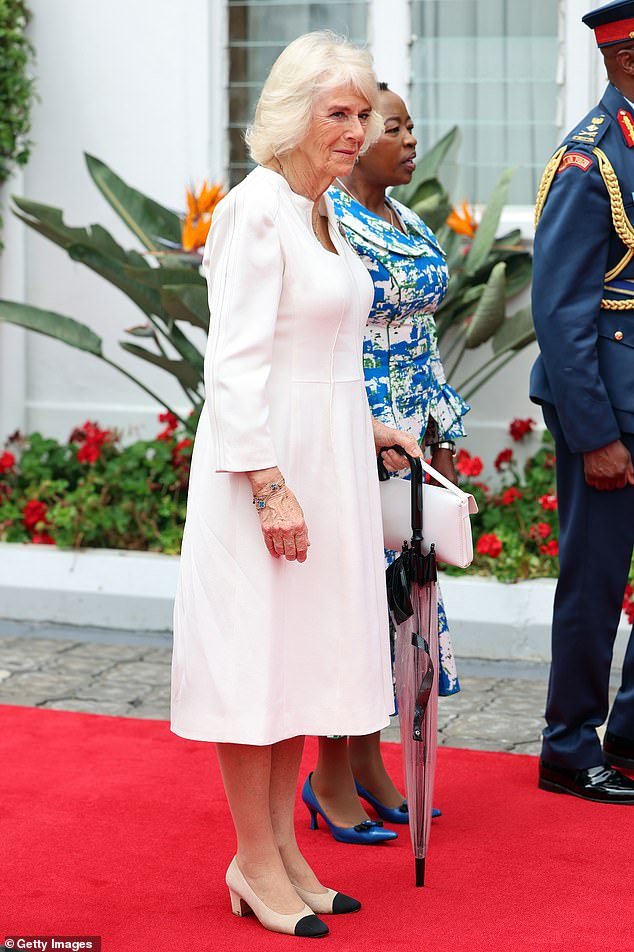
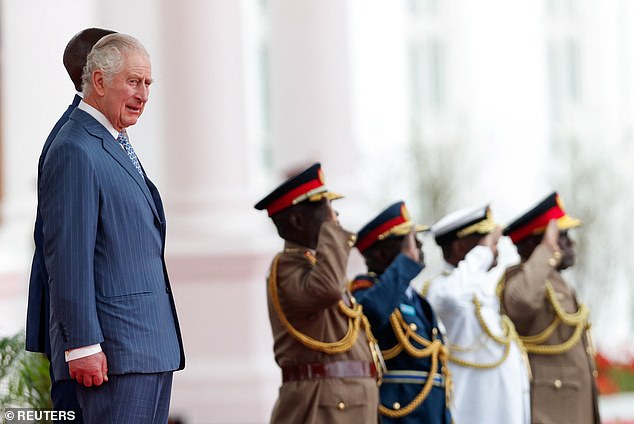

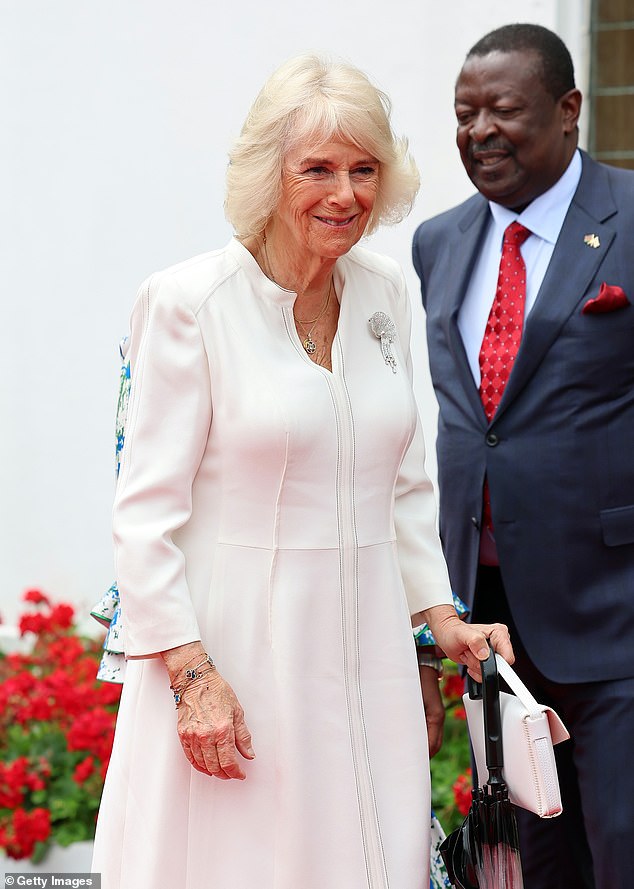
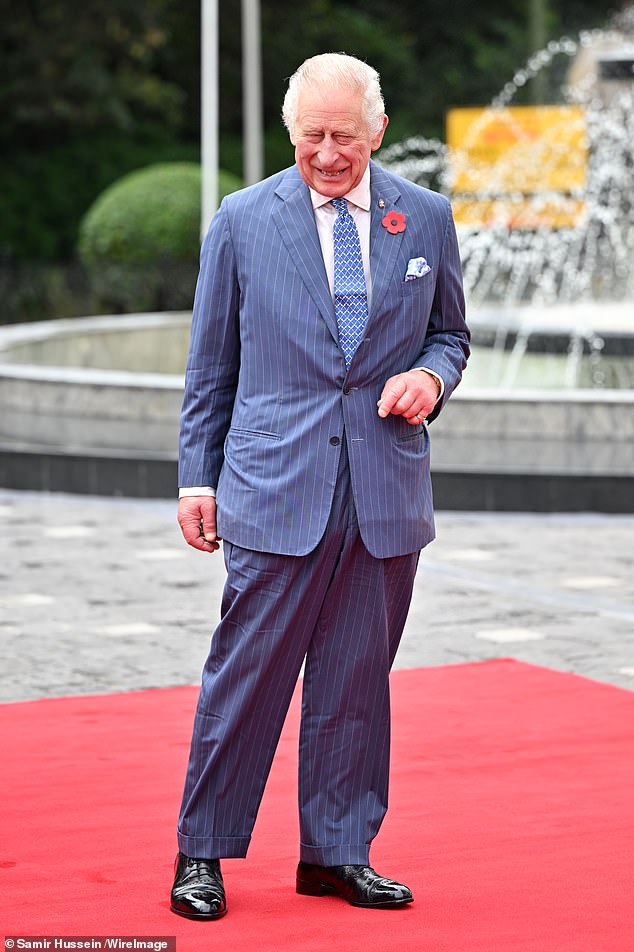
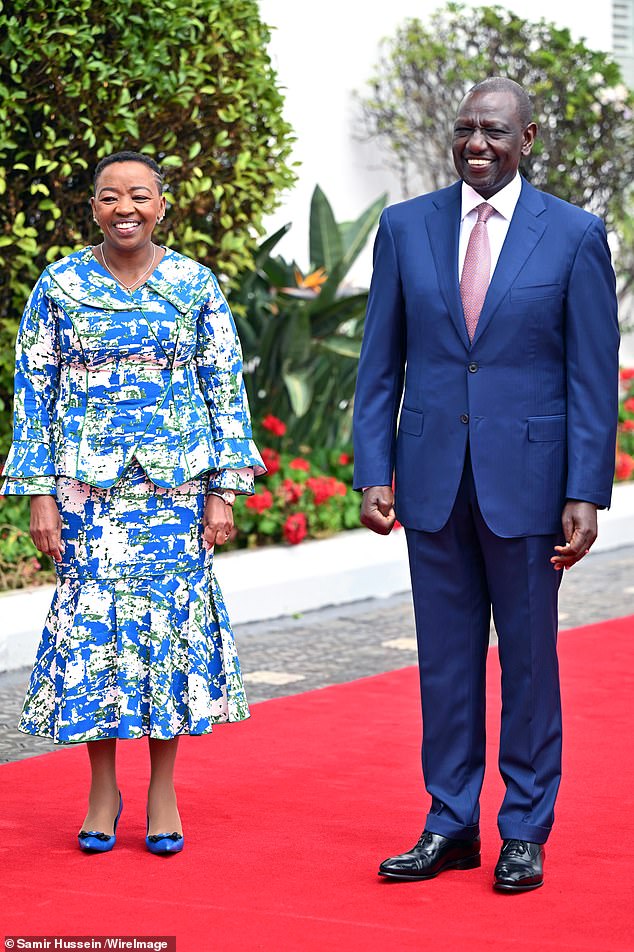
They said: ‘The way His Majesty addresses the subject will be with the great diplomacy, humanity and humility he brings to all difficult subjects, just as he did on State Visits to France and Germany, with whom the UK’s relationships had been strained for different reasons.
‘He has a wonderful way with language and a deep personal engagement with all communities that can help heal historic wounds with warmth, understanding and utmost sensitivity.
‘Often it is about listening rather than talking. In many cases people just want to be heard – and for the wrongs of the past to be acknowledged at the highest levels. And it is right they are.
‘While it is the Kenyan Government’s wish that the focus of this visit will very much be on celebrating the present and building the future, a symbolic recognition of the past is an important step in renewing existing friendships and sharing ambitions ahead for our two great nations.’
Charles will also touch upon the issue during other engagements, which cannot be disclosed in advance for security reasons.
The King and Queen will undertake their State Visit to Kenya from today until November 3.
His deputy Private Secretary Chris Fitzgerald has said the monarch will acknowledge ‘the more painful aspects of the United Kingdom and Kenya’s shared history’ – including the 1952 ‘Emergency’ or Mau Mau Revolt – as the country approaches its 60th anniversary of independence.
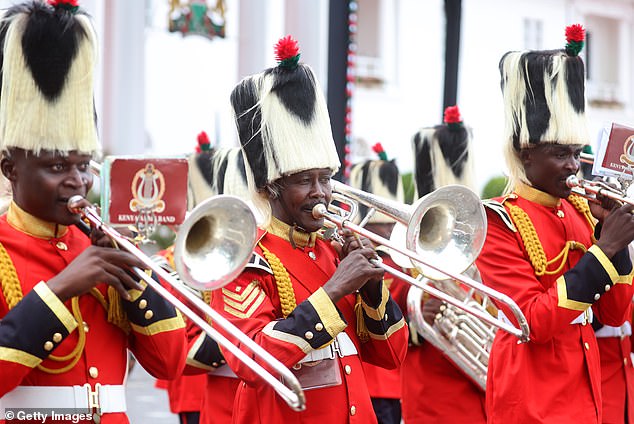
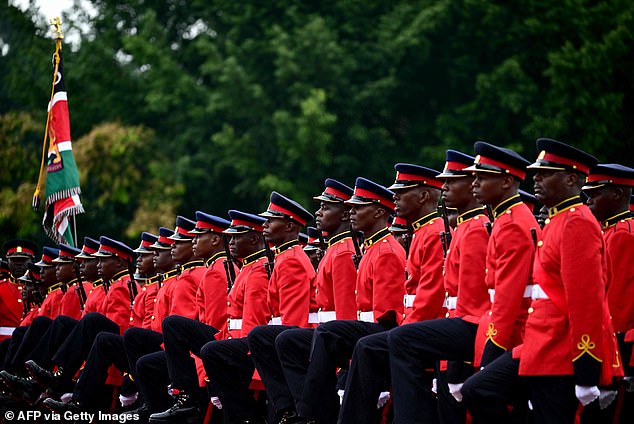
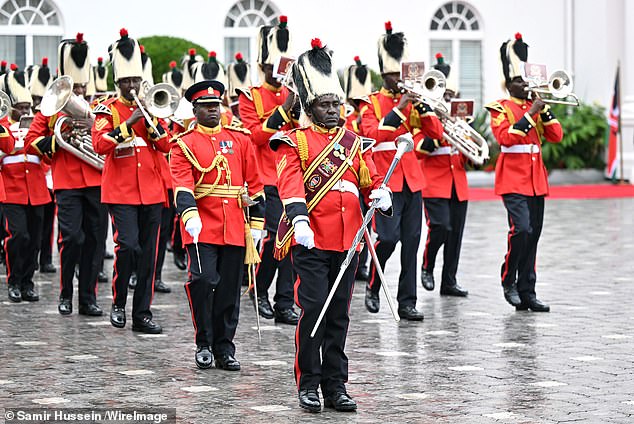
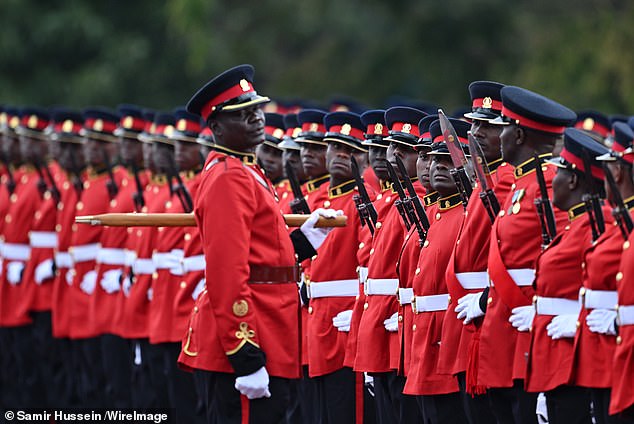
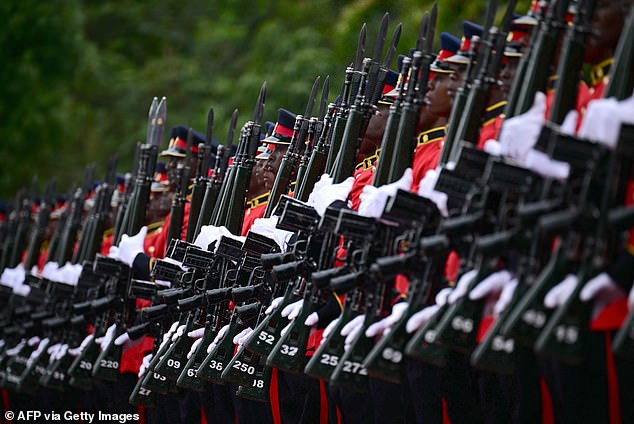
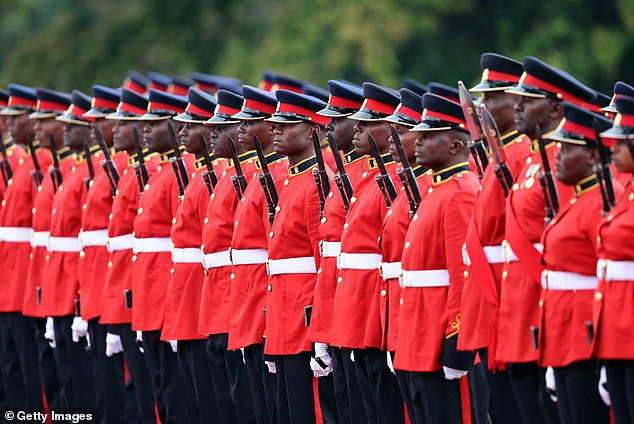
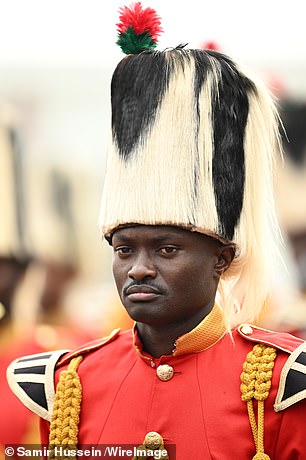
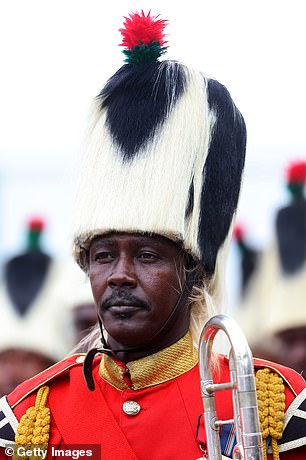
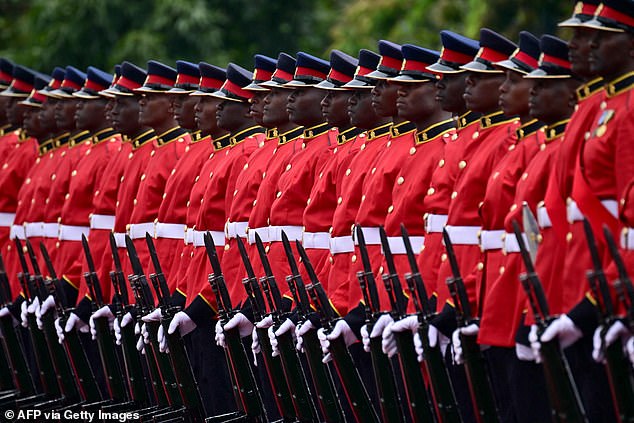
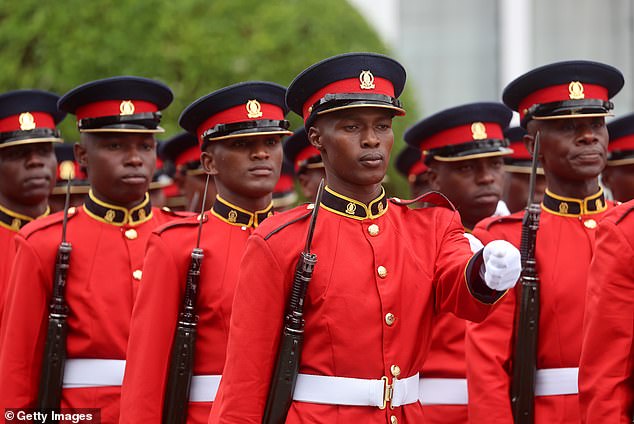
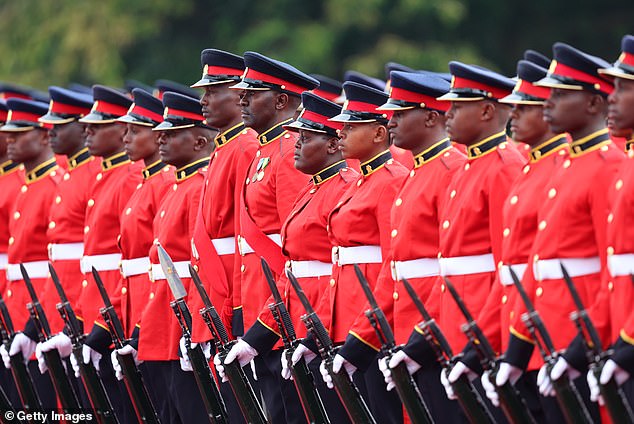
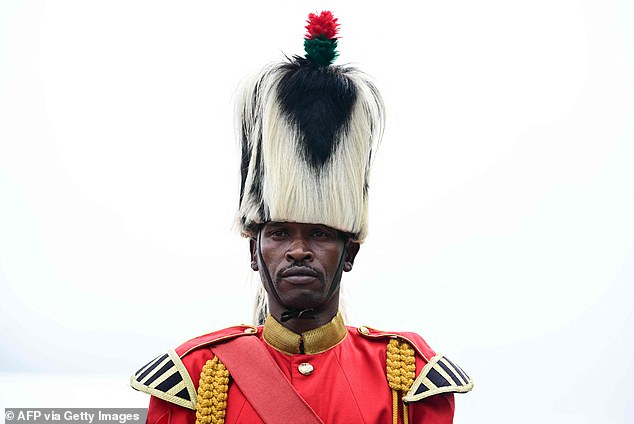
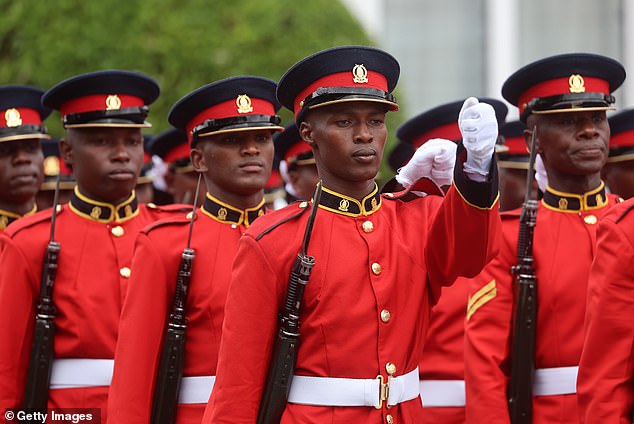
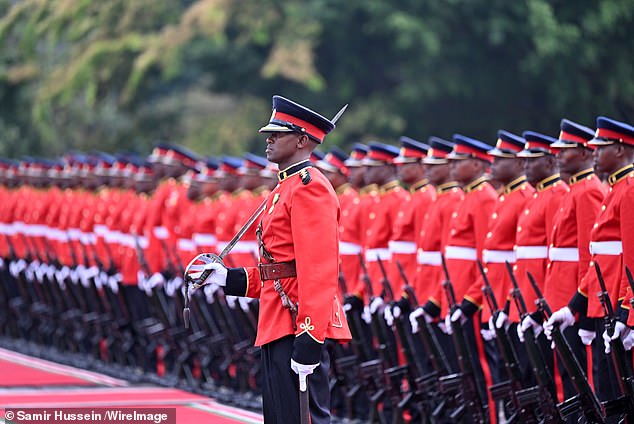
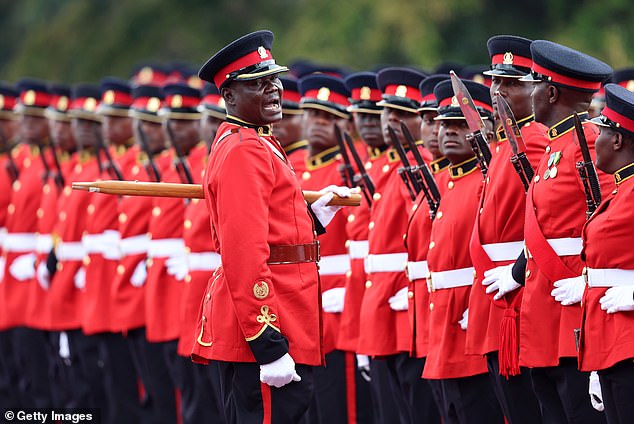
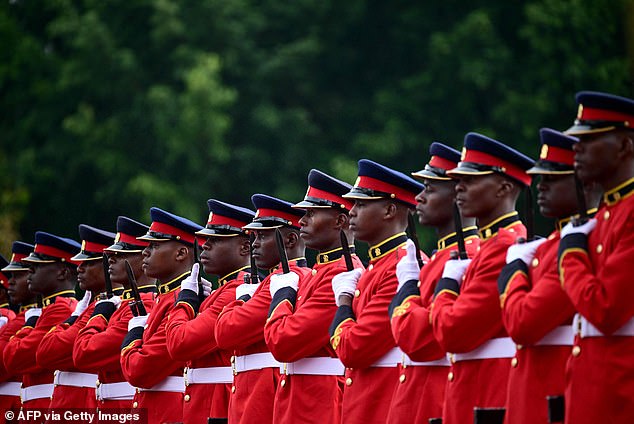
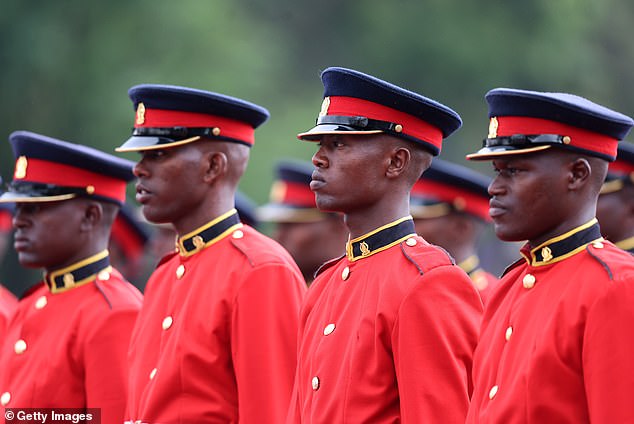
The British colonial presence in Kenya formally began in 1895 when white settlers were given huge tracts of rich farmland. Kenya became a British colony in 1920.
In 1953, the British declared a State of Emergency after a spate of strikes and violent opposition led by the Mau Mau party, amid growing anger at the dispossession of Kenyan lands and lack of political rights.
The Kenya Human Rights Commission say 90,000 Kenyans were executed, tortured or maimed in Britain’s brutal crackdown.
The country finally secured independence in November 1963, while Queen Elizabeth was on the throne.
In 2013, the British Government made an historic statement of regret over the ‘torture and other forms of ill treatment’ perpetrated by the colonial administration and paid out £19.9million to around 5,200 Kenyans for human rights abuses.
Kenyan campaigners continue to demand an apology, writing to Prince William last year asking for this and reparations for their ‘immense suffering under British rule’.
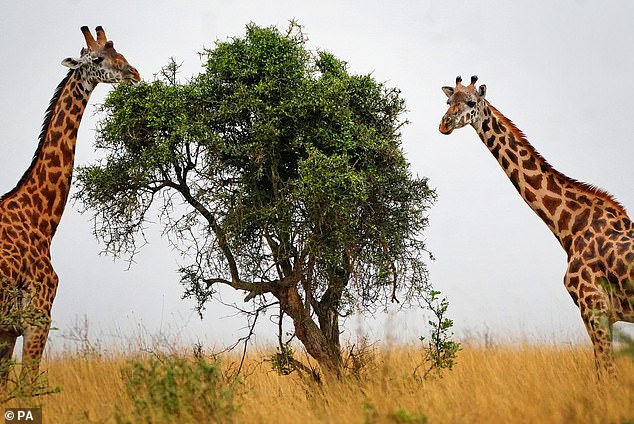
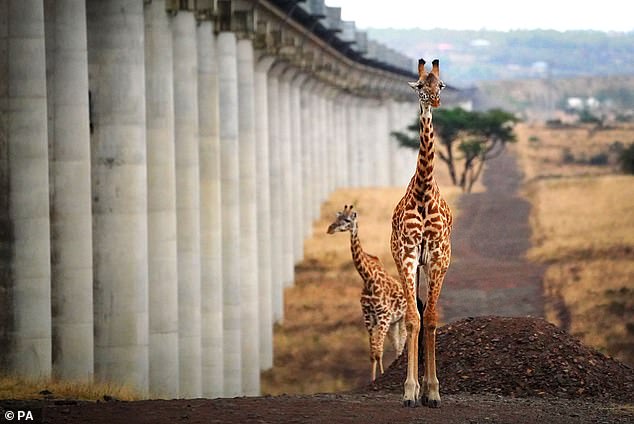
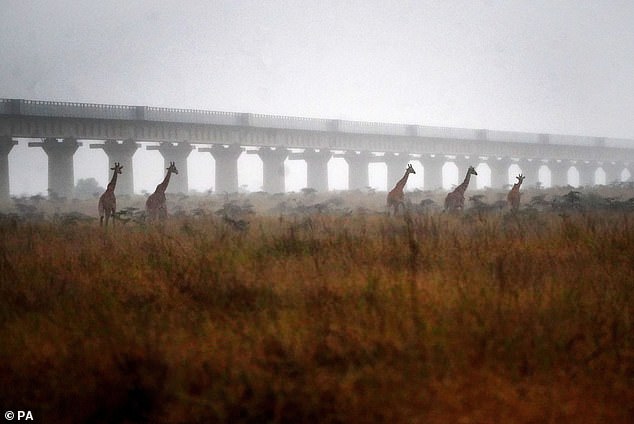
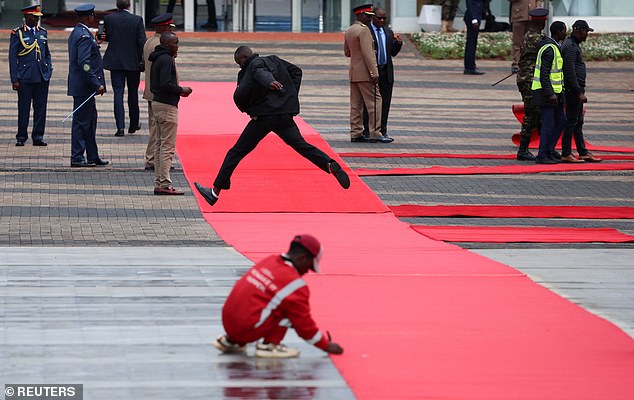
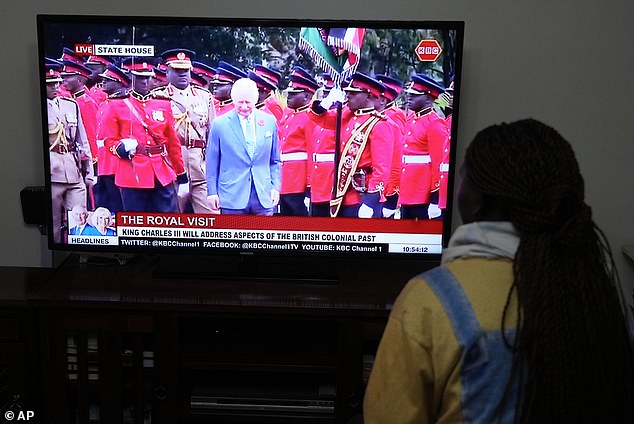
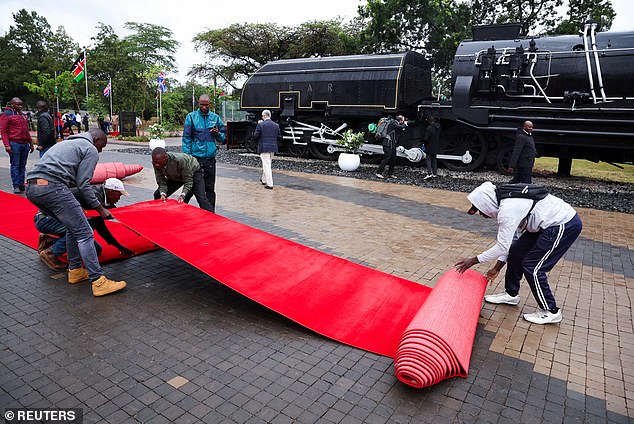
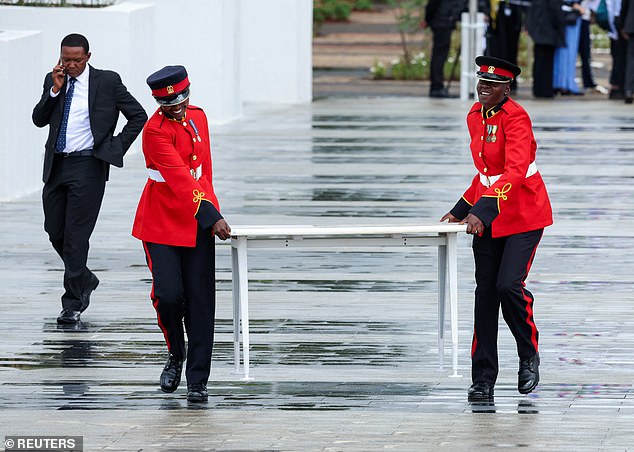
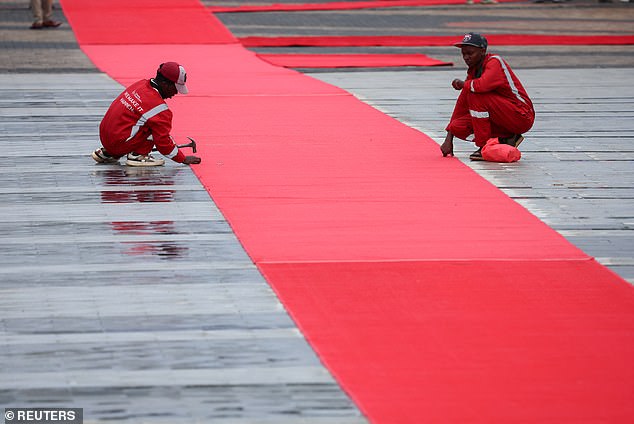
As the Daily Mail reported earlier this month, the King will become the first member of the royal family to acknowledge Britain’s ‘mea culpa’.
Since independence, the two countries have enjoyed a warm relationship, however, and it is hoped that the State Visit will further that.
It is understood that it came at the request of Kenya’s President Ruto, who is keen to focus on their ‘shared future’.
Last week at a Buckingham Palace reception for the Kenyan diaspora in the UK, invitees were clearly excited and optimistic about the trip ahead.
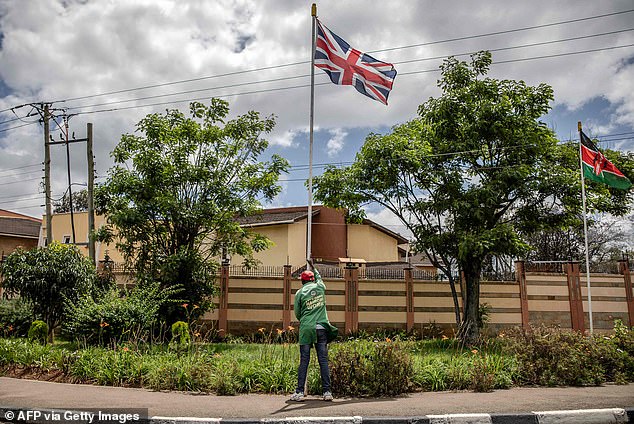
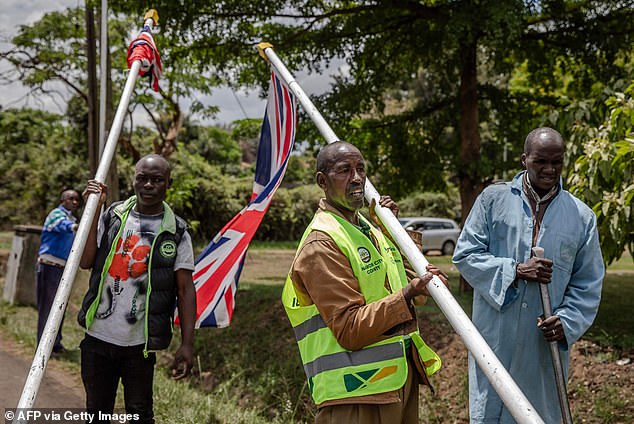
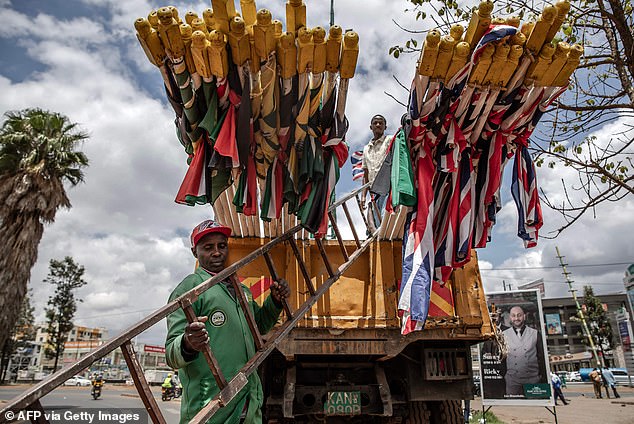
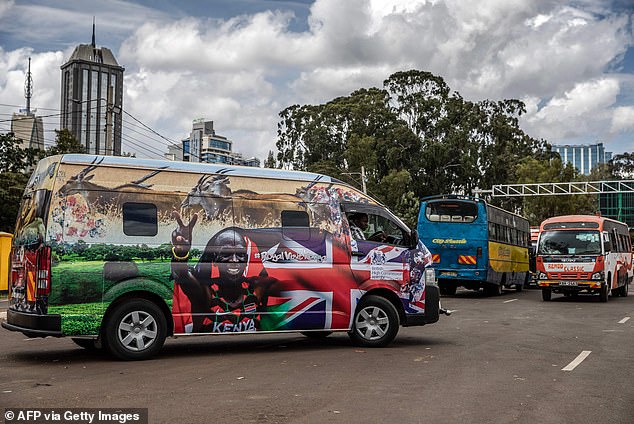
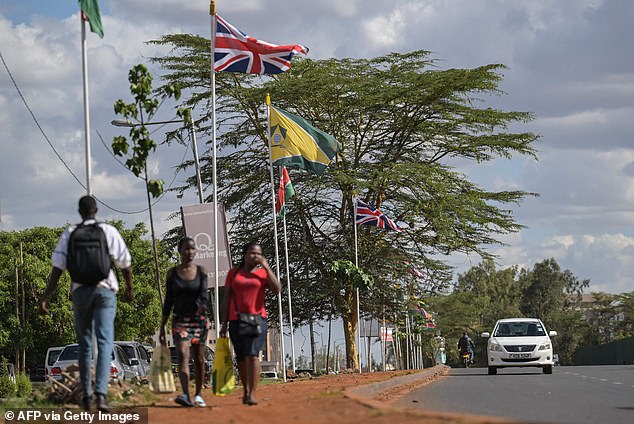
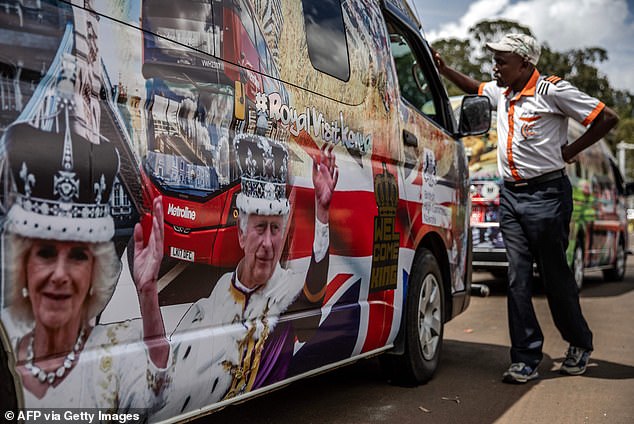
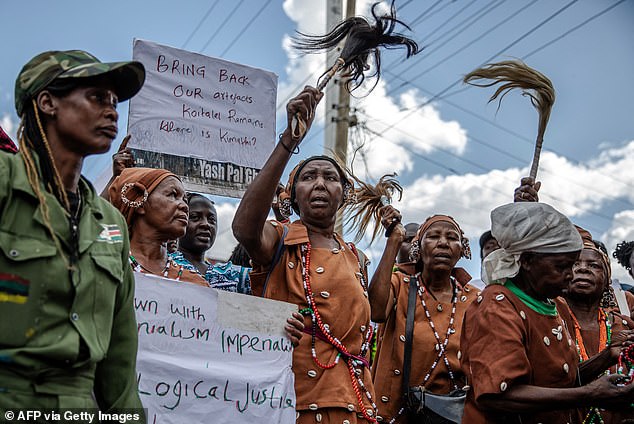
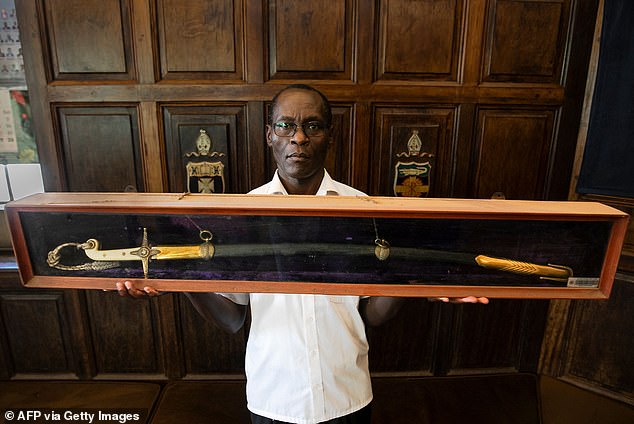
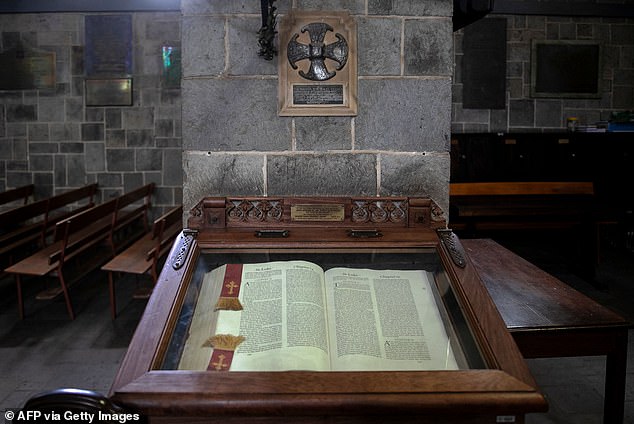
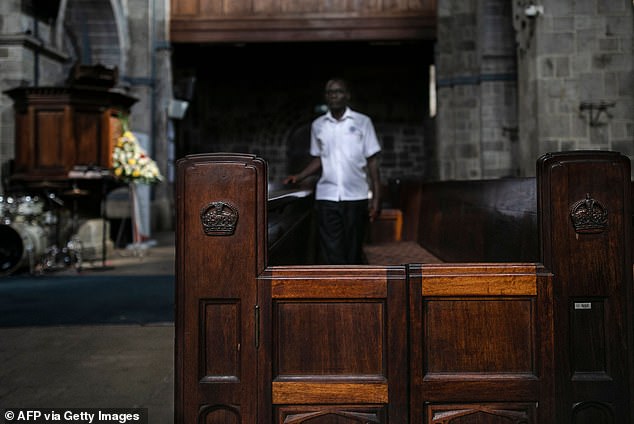
Barking and Dagenham Councillor Elizabeth Kangethe, who came to the UK 20 years ago and was named after the late Queen Elizabeth, told the Mail: ‘We have changed as countries since independence.
‘Things happened that shouldn’t have, but life has moved on and we are glad that we are both moving together forwards.
‘There is a lot of affection between the two countries. I am very proud of the way His Majesty is embracing Kenya. He will receive a very warm welcome.’
Source: dailymail.co.uk

Leave a Reply